2020-21 Survey of Canadians on Privacy-Related Issues
Final Report
Prepared for the Office of the Privacy Commissioner of Canada
Supplier Name: Phoenix Strategic Perspectives Inc. (SPI)
Contract Number: 2R008-200076 001 CY
Award Date: 2020-09-24
Contract Value: $68,697.49
Delivery Date: 2021-03-10
Registration Number: 038-20
For more information, please contact: publications@priv.gc.ca
Prepared for the Office of the Privacy Commissioner of Canada
Supplier name: Phoenix Strategic Perspectives Inc.
March 2021
This public opinion research report presents the results of a telephone survey conducted by Phoenix SPI on behalf of the Office of the Privacy Commissioner of Canada. The research study was conducted with 1,502 Canadians aged 16 and older between November 21st and December 20th, 2020.
This publication may be reproduced for non-commercial purposes only. Prior written permission must be obtained from the Office of the Privacy Commissioner of Canada. For more information on this report, please contact the Office of the Privacy Commissioner of Canada at: publications@priv.gc.ca or at:
Office of the Privacy Commissioner of Canada
30, Victoria Street
Gatineau, Quebec
K1A 1H3
Catalogue Number:
IP54-109/2021E-PDF
International Standard Book Number (ISBN):
978-0-660-37776-6
List of figures
- Figure 1: General knowledge of privacy rights
- Figure 2: Knowledge of how to protect privacy rights
- Figure 3: Concern about protection of personal privacy
- Figure 4: Knowledge of how new technologies affect privacy
- Figure 5: Views on whether businesses respect privacy rights
- Figure 6: Views on whether the federal government respects privacy rights
- Figure 7: Trust in different organizations to protect personal information
- Figure 8: Concern about social media platforms creating user profiles
- Figure 9: Concern about how companies or organizations will use online personal information
- Figure 10: Concern about identity theft
- Figure 11: Comfort sharing personal information in different scenarios
- Figure 12: Actions taken to protect privacy
- Figure 13: Actions taken to protect privacy
- Figure 14: Actions taken to protect privacy
- Figure 15: Support for the Government of Canada collecting / using Canadians’ personal information
- Figure 16: Comfort with Government of Canada collecting Canadians' personal information from financial institutions
- Figure 17: Comfort with the collection of Canadians’ personal information from online sources
- Figure 18: Extent to which Canadians feel informed about how their personal information is handled…
- Figure 19: Level of control over how personal information is used
- Figure 20: Impact of COVID-19 on views of privacy
- Figure 21: Ways in which privacy views have changed since the start of the pandemic
Executive Summary
The Privacy Commissioner of Canada is an advocate for the privacy rights of Canadians, with the powers to investigate complaints and conduct audits under two federal laws; publish information about information-handling practices in the public and private sectors; and conduct research into privacy issues. Phoenix Strategic Perspectives Inc. (Phoenix SPI) was commissioned by the Office of the Privacy Commissioner of Canada (OPC) to conduct a telephone survey of Canadians on privacy-related issues.
1. Background and Objectives
Mandated by Parliament to act as an ombudsman and guardian of privacy in Canada, the Privacy Commissioner, among other things, is responsible for enforcing the Personal Information Protection and Electronic Documents Act (PIPEDA). The OPC’s mandate to protect and promote privacy rights includes promoting awareness and understanding of privacy issues by the Canadian public. In support of this, the OPC, every two years, has conducted quantitative research with the general population to collect the information it needs to advance and report on its core responsibility of protecting privacy rights.
The purpose of this research is to better understand the extent to which Canadians are aware, understand, and perceive privacy-related issues. Specifically, the objective of the research is to explore Canadians’ attitudes and opinions of privacy issues that fall under the OPC’s four strategic privacy priorities: economics of personal information; government surveillance; reputation and privacy; and the body as information. In addition, this year, the OPC wanted the survey to address how, if at all, the unprecedented COVID-19 pandemic has influenced Canadians’ views and concerns over their privacy.
The research findings will be used to learn more about Canadians’ concerns and attitudes toward privacy, their awareness of privacy institutions, and views on personal information management as a whole. This knowledge will inform and guide outreach efforts with Canadians. The results will also help the OPC report on results as required in its Departmental Results Framework (DRF), specifically on whether privacy rights are respected and obligations are met, and whether Canadians are empowered to exercise their privacy rights.
2. Methodology
A 14-minute random digit dialling (RDD) telephone survey was administered to 1,502 Canadian residents, 16 years of age or older between November 21st and December 20th, 2020. An overlapping dual-frame (landline and cell phone) sample was used to minimize coverage error. The results can be considered representative of the population of Canadians aged 16 and older. Based on a sample of this size, the overall results can be considered accurate within ±2.5%, 19 times out of 20. The margin of error is greater for results pertaining to subgroups of the total sample. Data were weighted to reflect the population in terms of age, gender, and region. For a more complete description of the methodology, refer to the Appendix: 1. Technical Specifications.
3. Highlights
Many Canadians said they are knowledgeable about their privacy rights, in general and specifically when it comes to protecting these rights. Canadians continue to be concerned about protecting their personal privacy.
Nearly two-thirds of Canadians (64%) rated their knowledge of their privacy rights as good or very good. In addition, just over half (58%) said their knowledge of how to protect their privacy rights is good or very good. Canadians’ knowledge of their privacy rights and how to protect them has not changed since 2018. While concern about the protection of their privacy remains high among Canadians, the intensity of this concern has declined slightly, from 37% extremely concerned in 2016 and 2018 to 32% in 2020. Underscoring concern, almost half of Canadians (47%) do not have enough information to know how new technologies might affect their personal privacy (a small majority of 52% do feel confident about their knowledge of the privacy implications of new technologies).
More than six in 10 Canadians are confident that government respects their privacy rights; fewer feel this way about businesses. When it comes to trust in specific types of businesses, banks rate the highest among Canadians.
More than six in 10 Canadians (63%; up from 55% in 2018) feel that the federal government, in general, respects their privacy rights. Fewer, but still a significant minority of 45%, believe that businesses respect their privacy rights. Trust in businesses protecting privacy rights has increased seven percent since 2018, from 38% in 2018 to 45% this year. The vast majority of Canadians (81%) have at least a fair amount of trust that banks will protect the personal information they share with them. Following this, fewer have a fair amount or a great deal of trust in telecommunication and internet companies (47%), online retailers (40%) and Big Tech (39%). Canadians were least likely to trust social media companies to protect their personal information – 2% have a great deal and 15% a fair amount of trust in these companies.
Canadians are concerned about how their online personal information will be used by organizations.
Approximately nine in 10 Canadians (89%) are at least somewhat concerned about people using information available about them online to attempt to steal their identity, including almost half (48%) who said they are extremely concerned about identity theft. The proportion of Canadians concerned about identity theft has not changed since 2018. The vast majority of Canadians also are at least somewhat concerned about social media platforms gathering personal information that they (88%) or someone else (89%) posted online to create a detailed profile of their interests and personal traits. In addition, 88% of Canadians are at least somewhat concerned about how companies and organizations might use information available about them online to make decisions about them, such as for a job, an insurance claim or health coverage.
Canadians are reluctant to share personal information about their body, except when talking to a healthcare provide by phone or online.
Six in 10 Canadians (60%) said they are comfortable sharing personal information about their body while talking to a healthcare practitioner by phone or online, but far fewer are comfortable sharing this same information in various other scenarios. In fact, majorities of Canadians indicated they would be uncomfortable providing a DNA sample to a company that might share it with police (60%), providing a DNA sample to a company for genetic testing (55%), and allowing their fitness tracker data to be shared with employer / insurance companies (66%).
Many Canadians have refused to provide personal information due to privacy concerns and adjusted privacy settings on a social media account. Fewer have taken other actions to protect their privacy and some have even traded their personal information for discounts or incentives on goods or services.
Seven in 10 Canadians (71%; down from 76% in 2018) have refused to provide an organization or business with their personal information due to privacy concerns. Slightly more (74%) have adjusted privacy settings on a social media account. Far fewer have deleted a social media account due to privacy concerns (41%) or stopped doing business with a company that experienced a privacy breach (40%). In recognition of the value of their personal information to companies, more than one-third of Canadians (38%; up from 30% in 2018) have provided their personal information for discounts or incentives on a good or service.
Canadians’ views on the Government of Canada collecting and using citizens’ personal information are divided.
One-third of Canadians (32%) support the Government of Canada having powers to collect and use personal information as part of intelligence-gathering activities. Support declines seven percent when respondents were asked if the Government of Canada should have such powers, even if it means Canadians have to give up some personal privacy.
Outside of intelligence gathering, there is no strong consensus on what Canadians would feel comfortable with when it comes to the Government of Canada collecting personal information about citizens: 41% would be comfortable with the government collecting information from financial institutions to make economic decisions, 45% would be comfortable with the government collecting information from online sources to make decisions about access to government programs and services, and 57% would be comfortable with the government collecting information from online sources to investigate potential fraud.
Canadians are more likely to feel uninformed about how their personal information is handled by businesses and government, and many feel they have little control over how their information is used.
While 43% of Canadians feel informed about how their personal information is handled by companies, slightly more than half (55%) have not very much or no information at all about this. Similarly, 46% of Canadians feel informed about how government handles their personal information and 54% feel they are not well informed about this. The majority of Canadians also feel they have not very much or no control at all over how their personal information is used by companies (61%) or by government (65%).
4. Notes to Reader
- All results in the report are expressed as a percentage, unless otherwise noted.
- Throughout the report, percentages may not always add to 100 due to rounding and/or multiple responses being offered by respondents.
- The number of respondents changes throughout the report because questions were asked of sub-samples of survey respondents. Readers should be aware of this and exercise caution when interpreting results based on smaller numbers of respondents.
- Only subgroup differences that are statistically significant at the 95% confidence level and pertain to a subgroup of at least n=20 are described in the report. The exception regarding sample size are differences indicative of a pattern.
- For the regional results, surveys completed by respondents from Nunavut or the Northwest Territories are grouped with the Prairies, and surveys completed by respondents from the Yukon are grouped with British Columbia.
- Reference is made to findings from similar surveys conducted in previous years. When comparing results over time, it should be kept in mind that the sample size and sample frame varies from wave to wave. Prior to 2012, approximately 2,000 Canadians were interviewed compared to approximately 1,500 starting in 2012. In addition, a dual sample frame (landline and cell phones) was introduced in 2012.
- The survey questionnaire is appended to the report.
- The tabulated data are available under separate cover.
5. Contract Value
The contract value was $68,697.49 (HST included).
6. Statement of Political Neutrality
I hereby certify as a Senior Officer of Phoenix Strategic Perspectives that the deliverables fully comply with the Government of Canada political neutrality requirements outlined in the Communications Policy of the Government of Canada and Procedures for Planning and Contracting Public Opinion Research. Specifically, the deliverables do not contain any reference to electoral voting intentions, political party preferences, standings with the electorate, or ratings of the performance of a political party or its leader.
Original signed by
Alethea Woods
President
Phoenix Strategic Perspectives Inc.
Detailed Findings
1. Knowledge, concern, and general perceptions
More than six in 10 Canadians claim to be knowledgeable of their privacy rights
Nearly two-thirds of Canadians surveyed rated their knowledge of their privacy rights as good (50%) or very good (14%). In contrast, just under one in five Canadians rated their knowledge of their privacy rights as poor (14%) or very poor (4%). Canadians’ knowledge of their privacy rights has been consistent since 2016 (64% in 2020 versus 64% in 2018 and 65% in 2016).Footnote 1
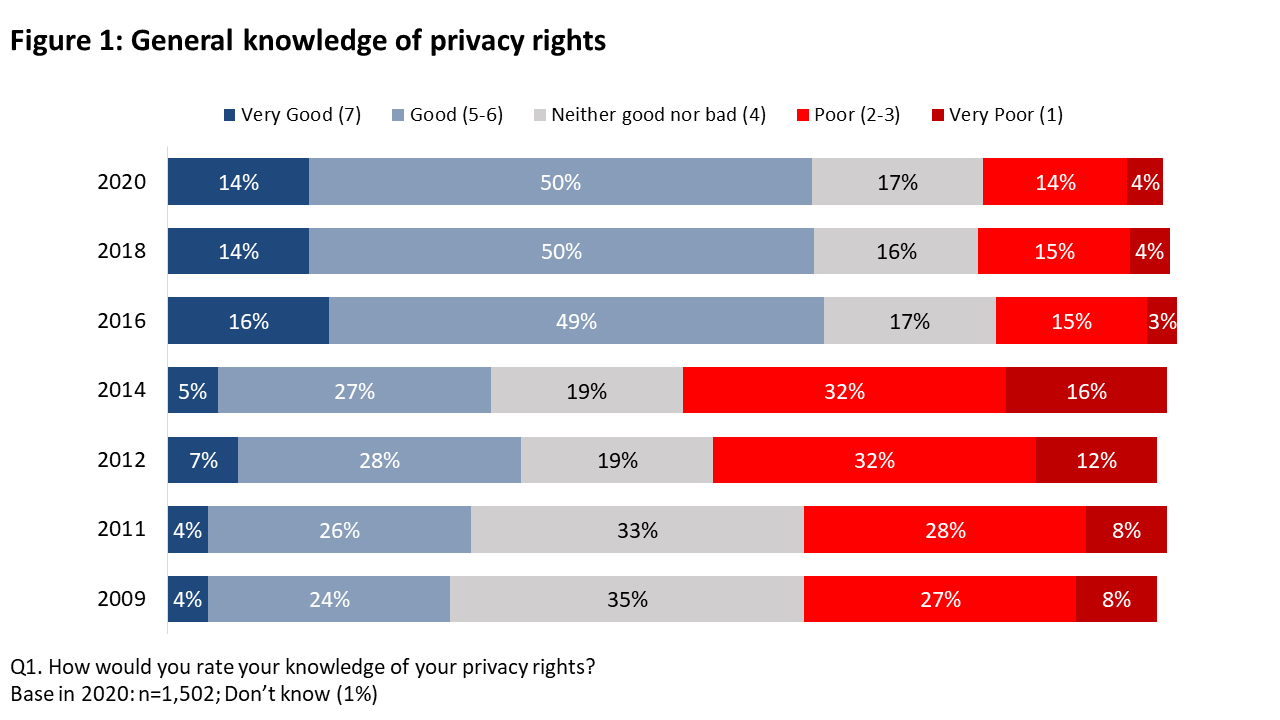
Text version of Figure 1
Figure 1: General knowledge of privacy rights
Q1. How would you rate your knowledge of your privacy rights?
| Year | Very Good (7) |
Good (5-6) | Neither good nor bad (4) |
Poor (2-3) | Very Poor (1) |
|---|---|---|---|---|---|
| 2020 | 14% | 50% | 17% | 14% | 4% |
| 2018 | 14% | 50% | 16% | 15% | 4% |
| 2016 | 16% | 49% | 17% | 15% | 3% |
| 2014 | 5% | 27% | 19% | 32% | 16% |
| 2012 | 7% | 28% | 19% | 32% | 12% |
| 2011 | 4% | 26% | 33% | 28% | 8% |
| 2009 | 4% | 24% | 35% | 27% | 8% |
| Base in 2020: n=1,502; Don’t know (1%) | |||||
Canadians aged 55 and older (70%), as well as those aged 35 to 54 (66%), were more likely to rate their knowledge of their privacy rights as good or very good (i.e., scores of 5-7 on the 7-point scale) when compared to those aged 16 to 24 (55%) and 25-34 (54%).
More than half of Canadians know how to protect privacy rights
More than half (58%) of Canadians rated their knowledge of how to protect their privacy rights as good (46%) or very good (12%). In contrast, approximately one-quarter (23%) said they have poor (19%) or very poor (4%) knowledge of how to protect their privacy rights. Knowledge of how to protect privacy rights is virtually unchanged since 2018.
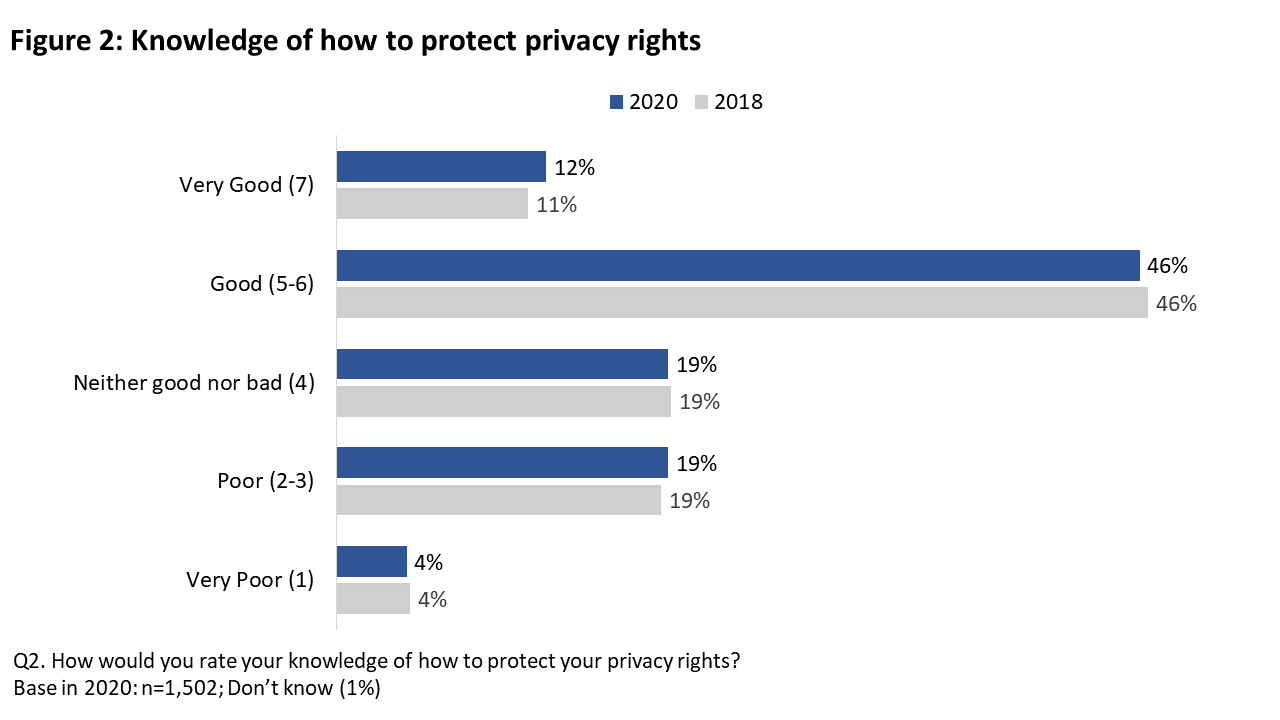
Text version of Figure 2
Figure 2: Knowledge of how to protect privacy rights
Q2. How would you rate your knowledge of how to protect your privacy rights?
| Rate | 2020 | 2018 |
|---|---|---|
| Very Good (7) | 12% | 11% |
| Good (5-6) | 46% | 46% |
| Neither good nor bad (4) | 19% | 19% |
| Poor (2-3) | 19% | 19% |
| Very Poor (1) | 4% | 4% |
| Base in 2020: n=1,502; Don’t know (1%) | ||
Self-assessed knowledge is significantly higher in Atlantic Canada (62%) and Ontario (60%) than it is British ColumbiaFootnote 2, where exactly half (50%) said they have good or very good knowledge of how to protect their privacy rights (i.e., scores of 5-7 on the 7-point scale).
Nearly nine in 10 Canadians express some level of concern about protecting personal privacy
The vast majority of Canadians (87%) expressed some level of concern about the protection of their privacy (i.e., scores of 3-7 on the 7-point scale), including 32% of Canadians who said they are extremely concerned about the protection of personal privacy. Few Canadians (13%) are not concerned about protecting their privacy. These results are largely unchanged from 2018; however, the proportion of Canadians who said they are extremely concerned about the protection of their personal privacy has decreased five percent since 2018 (32% in 2020 versus 37% in 2018).
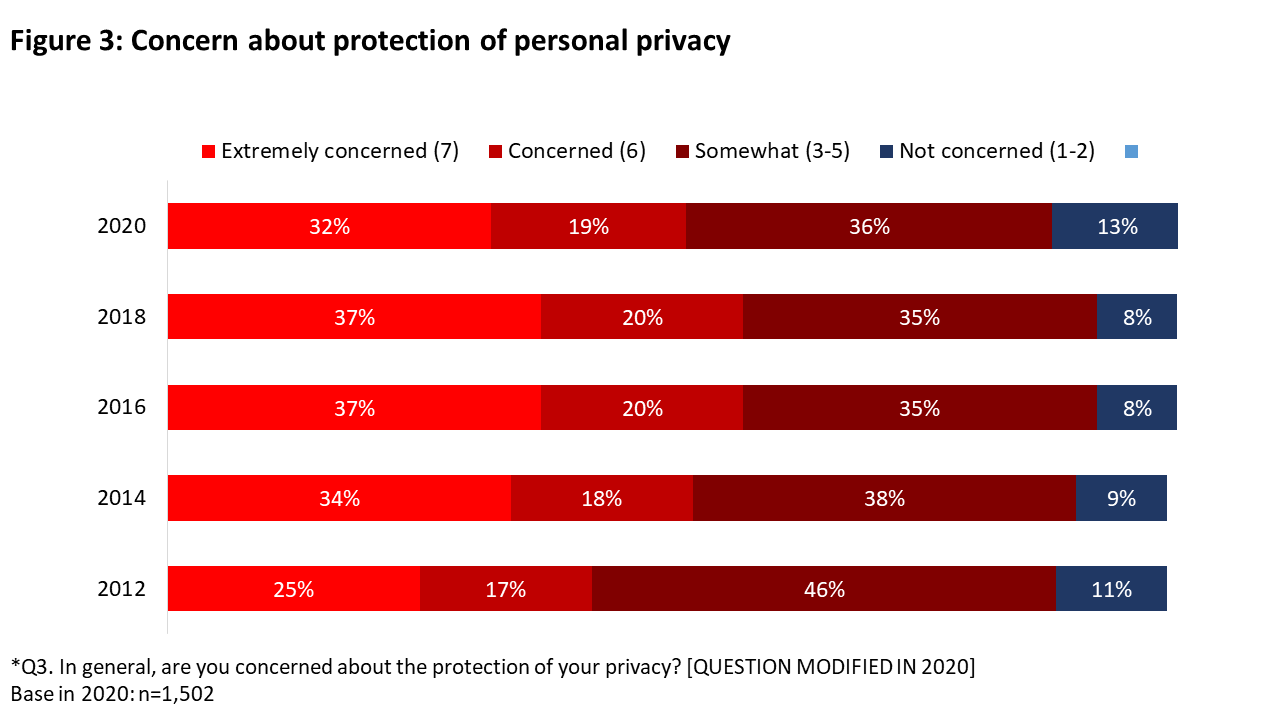
Text version of Figure 3
Figure 3: Concern about protection of personal privacy
*Q3. In general, are you concerned about the protection of your privacy? [QUESTION MODIFIED IN 2020]
| Year | Extremely concerned (7) |
Concerned (6) |
Somewhat (3-5) |
Not concerned (1-2) |
|---|---|---|---|---|
| 2020 | 32% | 19% | 36% | 13% |
| 2018 | 37% | 20% | 35% | 8% |
| 2016 | 37% | 20% | 35% | 8% |
| 2014 | 34% | 18% | 38% | 9% |
| 2012 | 25% | 17% | 46% | 11% |
| Base in 2020: n=1,502 | ||||
Canadians in Quebec (39%) were significantly more likely than Canadians in Atlantic Canada (28%), the Prairies (24%), and British Columbia (29%) to be extremely concerned (a score of 7 on the 7-point scale) about protecting their personal privacy. Additionally, the likelihood of being extremely concerned about the protection of one’s personal privacy increased with age, from 20% of 16 to 24 year olds to 38% of those aged 55+.
Many feel confident about their knowledge on the privacy implications of new technologies
Approximately half of Canadians (52%) said they are confident they have enough information to know how new technologies might affect their personal privacy. In contrast, almost as many (47%) said they did not have enough information about this (30% disagreed outright with this premise and 17% were neutral). This represents a slight increase since 2018 when 48% reported their agreement with the statement: “I am confident that I have enough information to know how new technologies might affect my personal privacy.”
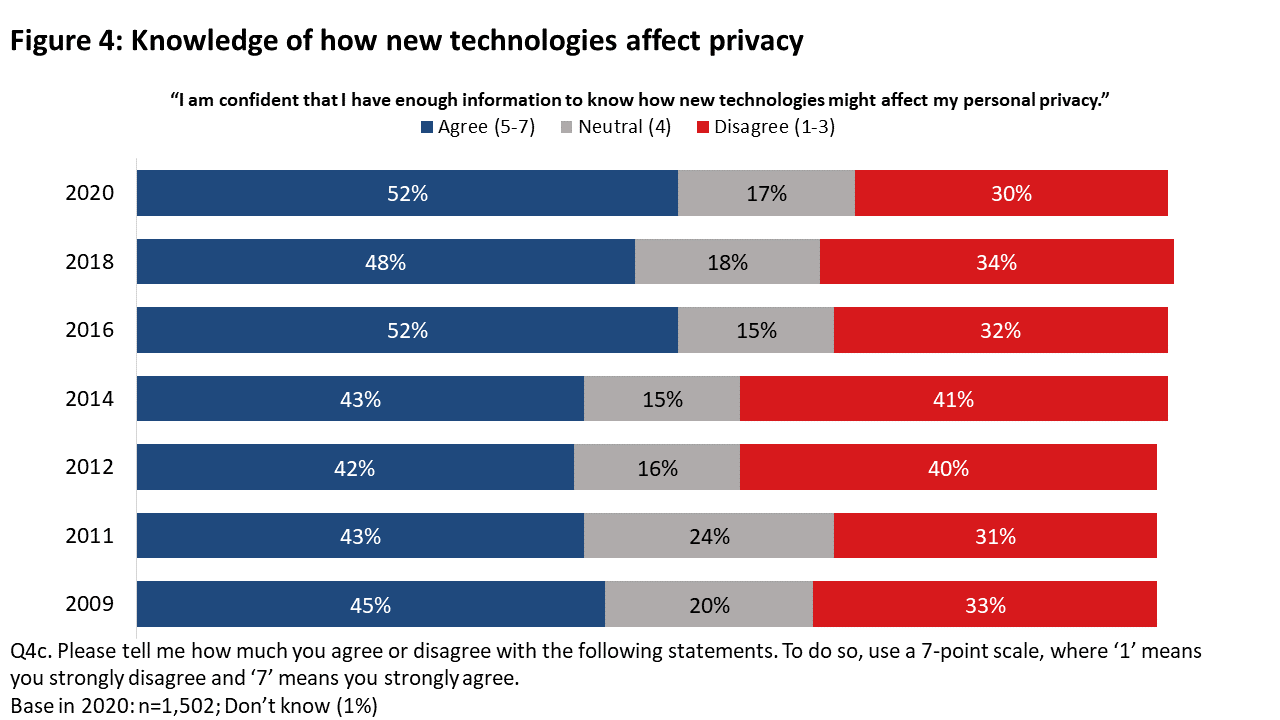
Text version of Figure 4
Figure 4: Knowledge of how new technologies affect privacy
Q4c. Please tell me how much you agree or disagree with the following statements. To do so, use a 7-point scale, where ‘1’ means you strongly disagree and ‘7’ means you strongly agree.
“I am confident that I have enough information to know how new technologies might affect my personal privacy.”
| Year | Agree (5-7) | Neutral (4) | Disagree (1-3) |
|---|---|---|---|
| 2020 | 52% | 17% | 30% |
| 2018 | 48% | 18% | 34% |
| 2016 | 52% | 15% | 32% |
| 2014 | 43% | 15% | 41% |
| 2012 | 42% | 16% | 40% |
| 2011 | 43% | 24% | 31% |
| 2009 | 45% | 20% | 33% |
| Base in 2020: n=1,502; Don’t know (1%) | |||
The following subgroups of Canadians were more likely to agree that they have enough information to know how new technologies might affect their personal privacy:
- Those who reside in Quebec (57%) compared to British Columbia (46%).
- 16 to 24 year olds (65%) and 25 to 34 year olds (59%) compared to those aged 35+ (49%).
- Men (56%) compared to women (50%).
- Those who completed college or some university (57%) or at least some high school (58%) compared to university graduates (45%).
2. Attitudes Towards Privacy and Related Issues
Significant minority are confident that businesses respect their privacy rights
More than four in 10 Canadians (45%) believe that businesses in general respect their privacy rights. In contrast, a significant minority of Canadians (36%) disagreed with the statement, I feel that businesses in general respect my privacy rights. Trust in businesses protecting the privacy rights of Canadians has increased seven percent since 2018, from 38% in 2018 to 45% this year.
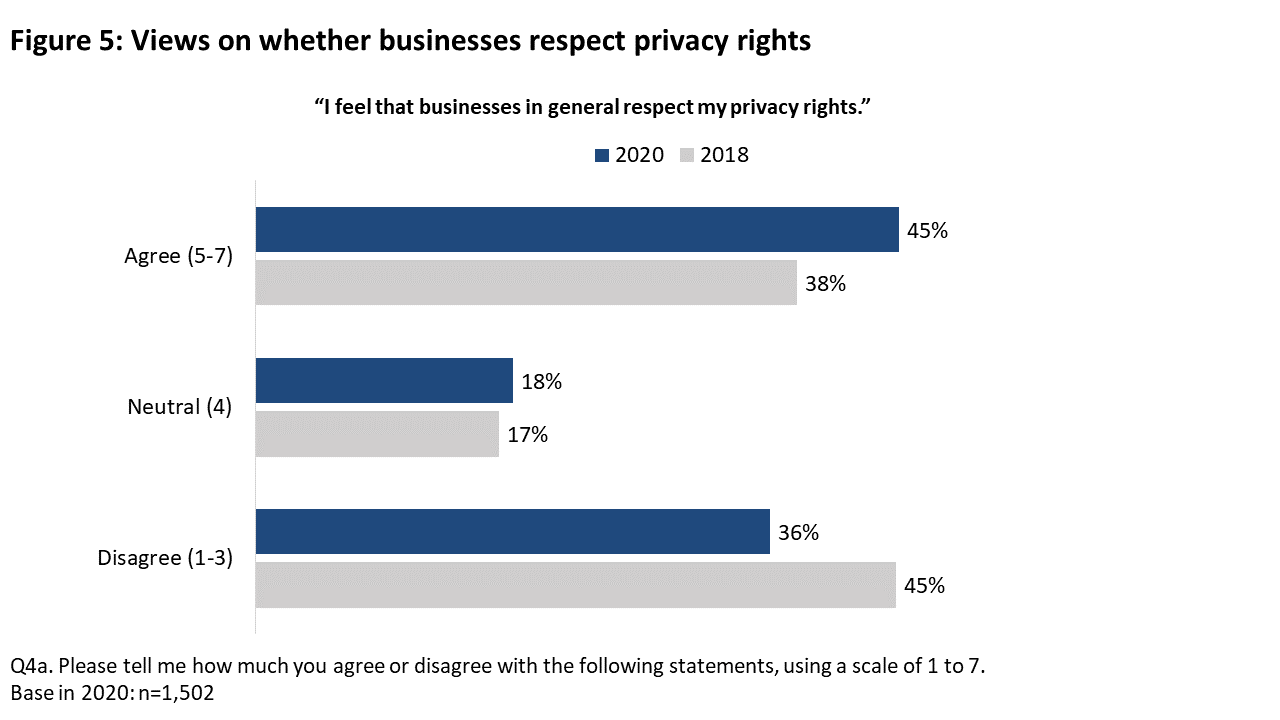
Text version of Figure 5
Figure 5: Views on whether businesses respect privacy rights
Q4a. Please tell me how much you agree or disagree with the following statements, using a scale of 1 to 7.
“I feel that businesses in general respect my privacy rights.”
| Level of agreement | 2020 | 2018 |
|---|---|---|
| Agree (5-7) | 45% | 38% |
| Neutral (4) | 18% | 17% |
| Disagree (1-3) | 36% | 45% |
| Base in 2020: n=1,502 | ||
Agreement that businesses respect the privacy rights of Canadians was higher among residents of Atlantic Canada (53%) and the PrairiesFootnote 3 (49%). Moreover, while half (50%) of women agreed that businesses respect their privacy rights, fewer men (40%) felt the same.
More than six in 10 Canadians are confident that government respects their privacy rights
More than six in 10 Canadians (63%) feel that the federal government, in general, respects their privacy rights. This represents an eight percent increase from 2018, when 55% of respondents agreed with the statement: I feel that the federal government in general respects my privacy rights. Just under one-quarter (23%) disagreed, indicating that they feel the federal government does not respect their privacy rights.
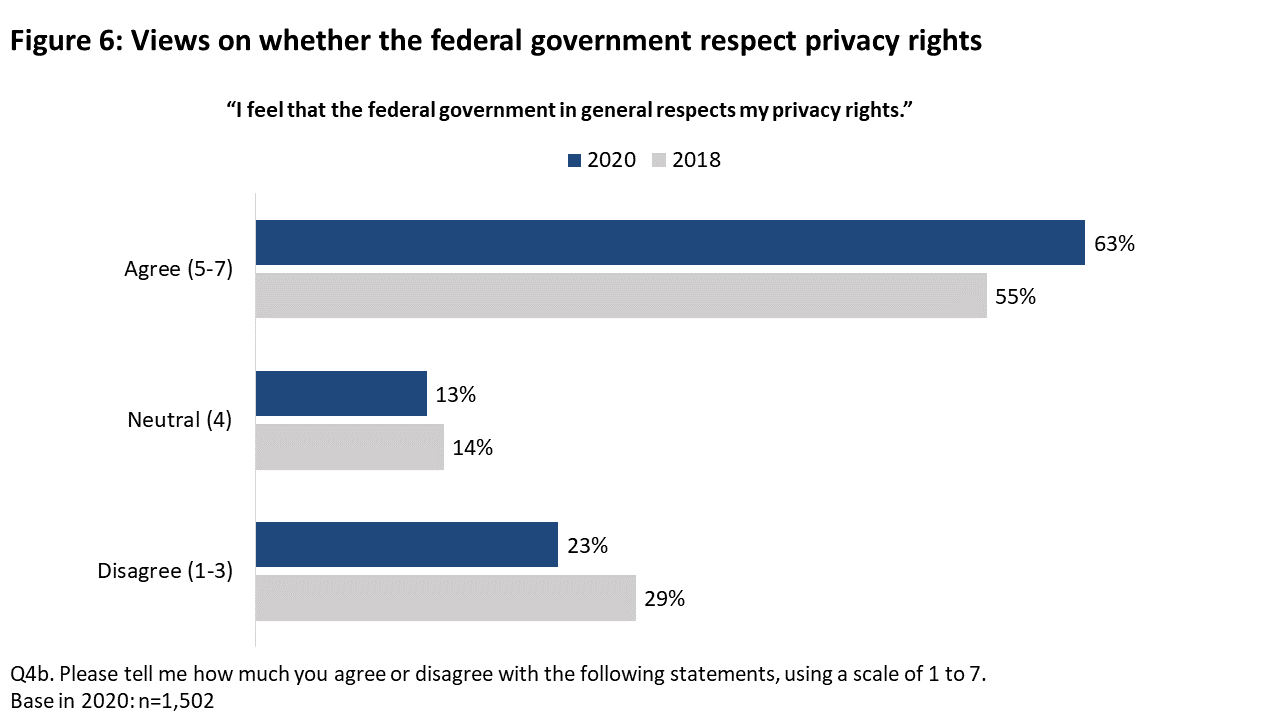
Text version of Figure 6
Figure 6: Views on whether the federal government respect privacy rights
Q4b. Please tell me how much you agree or disagree with the following statements, using a scale of 1 to 7.
| Level of agreement | 2020 | 2018 |
|---|---|---|
| Agree (5-7) | 63% | 55% |
| Neutral (4) | 13% | 14% |
| Disagree (1-3) | 23% | 29% |
| Base in 2020: n=1,502 | ||
The likelihood of agreeing that the federal government respects privacy rights was highest among residents of Quebec (74%) and Atlantic Canada (71%).
Majority trust banks to protect their personal information; limited trust in other organizations
When asked to rate their level of trust in various organizations, eight in 10 Canadians (81%) said they have at least a fair amount of trust in banks to protect the personal information they share with them.
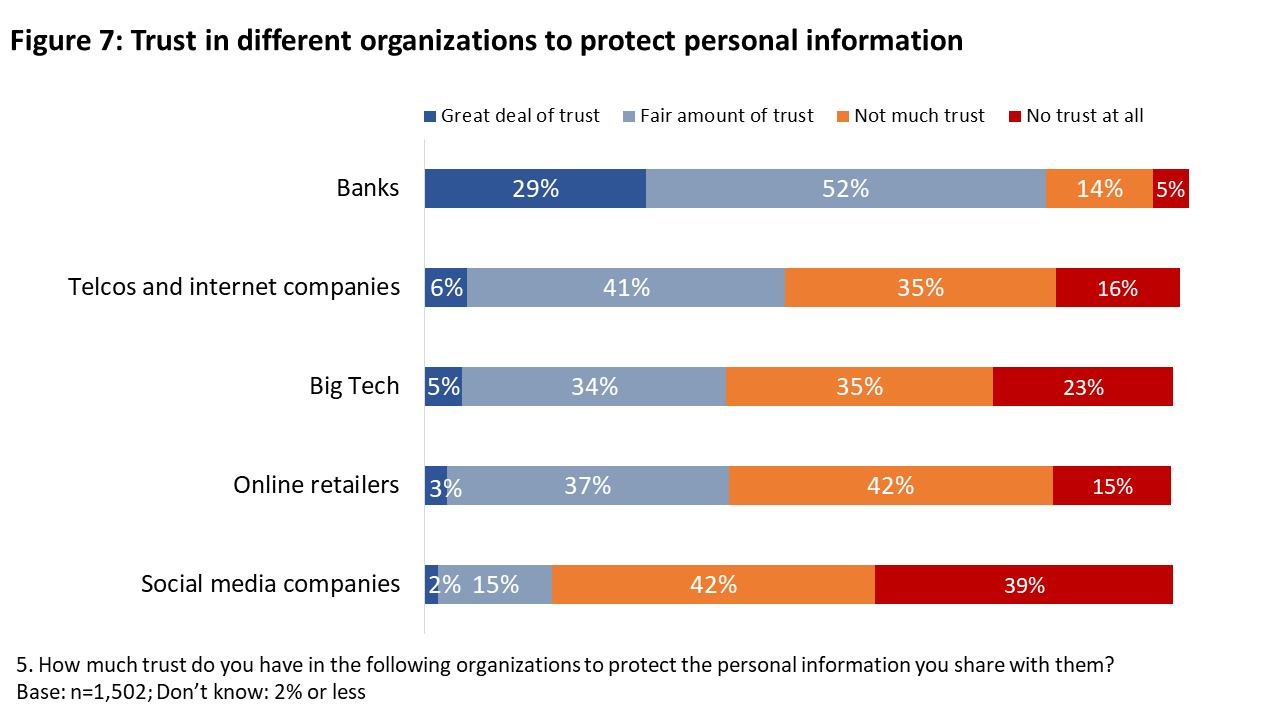
Text version of Figure 7
Figure 7: Trust in different organizations to protect personal information
5. How much trust do you have in the following organizations to protect the personal information you share with them?
| Organizations | Great deal of trust |
Fair amount of trust |
Not much trust |
No trust at all |
|---|---|---|---|---|
| Banks | 29% | 52% | 14% | 5% |
| Telcos and internet companies |
6% | 41% | 35% | 16% |
| Big Tech | 5% | 34% | 35% | 23% |
| Online retailers | 3% | 37% | 42% | 15% |
| Social media companies |
2% | 15% | 42% | 39% |
| Base: n=1,502; Don’t know: 2% or less | ||||
Following this, fewer than half have a fair amount (41%) or a great deal (6%) of trust in telecommunication and internet companies, while approximately four in 10 reported some level of trust in Big Tech (39%) and online retailers (40%). Canadians expressed the lowest level of trust in the ability of social media companies to protect their personal information – 2% have a great deal and 15% a fair amount of trust.
Canadians aged 16 to 24 were among those most likely to report at least a fair amount of trust in all organizations:
- Banks, 90%;
- Telecommunications and internet companies, 58%;
- Big Tech, 51%;
- Online retailers, 51%; and
- Social media companies, 24%.
3. Online and mobile privacy
Most Canadians are concerned about social media platforms gathering personal information
Nearly nine in 10 Canadians are at least somewhat concerned about social media platforms gathering personal information that they (88%) or someone else (89%) posted online to create a detailed profile of their interests and personal traits. The proportion of Canadians extremely concerned increases slightly when the personal information being gathered by social media platforms is information that someone else has posted online about them (40% versus 37%).Footnote 4
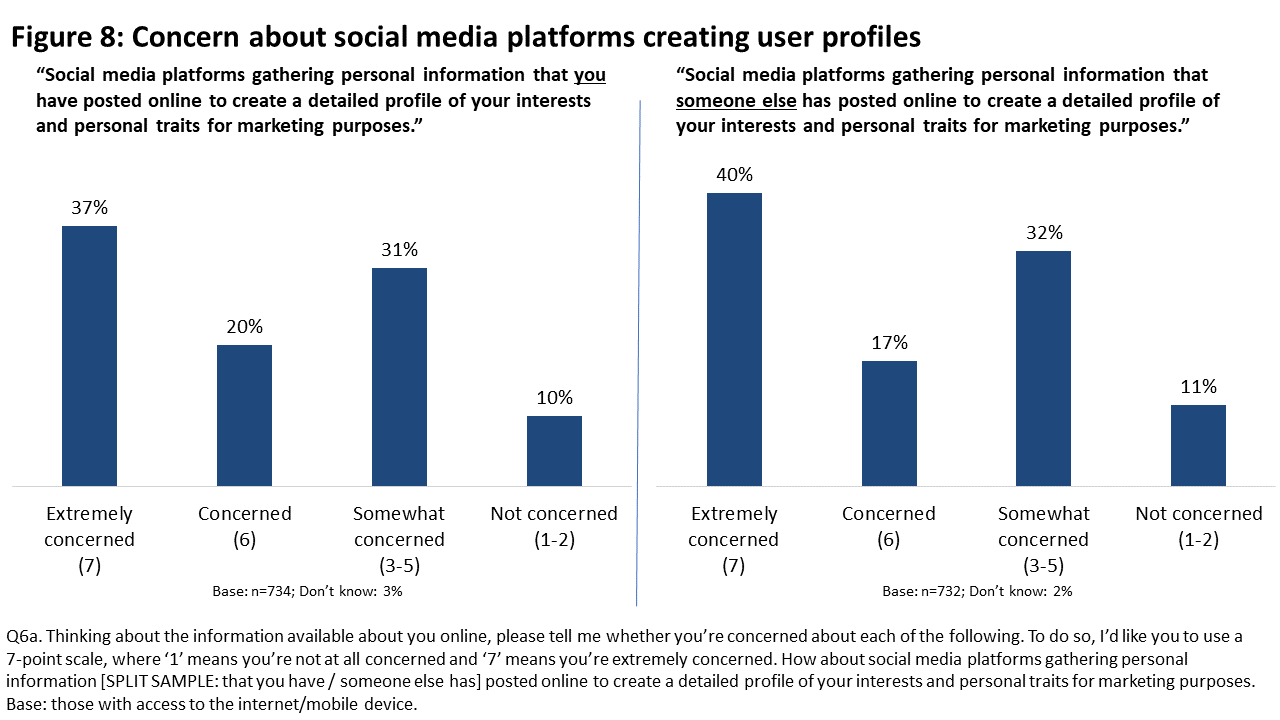
Text version of Figure 8
Figure 8: Concern about social media platforms creating user profiles
Q6a. Thinking about the information available about you online, please tell me whether you’re concerned about each of the following. To do so, I’d like you to use a 7-point scale, where ‘1’ means you’re not at all concerned and ‘7’ means you’re extremely concerned. How about social media platforms gathering personal information [SPLIT SAMPLE: that you have / someone else has] posted online to create a detailed profile of your interests and personal traits for marketing purposes.
“Social media platforms gathering personal information that you have posted online to create a detailed profile of your interests and personal traits for marketing purposes.”
| Level of concern | % of respondents |
|---|---|
| Extremely concerned (7) | 37% |
| Concerned (6) | 20% |
| Somewhat concerned (3-5) | 31% |
| Not concerned (1-2) | 10% |
| Base: n=734; Don’t know: 3% | |
“Social media platforms gathering personal information that someone else has posted online to create a detailed profile of your interests and personal traits for marketing purposes.”
| Level of concern | % of respondents |
|---|---|
| Extremely concerned (7) | 40% |
| Concerned (6) | 17% |
| Somewhat concerned (3-5) | 32% |
| Not concerned (1-2) | 11% |
| Base: n=732; Don’t know: 2% | |
| Base: those with access to the internet/mobile device. | |
Canadians aged 55 and older were more likely than younger Canadians to express concern about social media platforms gathering personal information that they or someone else posted online to create a detailed profile of their interests and personal traits.
Many Canadians are concerned about how companies and organizations use online personal information
Eighty-eight percent (88%) of Canadians said they are at least somewhat concerned about how companies and organizations might use information available about them online to make decisions about them, such as for a job, an insurance claim or health coverage. Concern is more likely to be moderate (41%) than strong (29%), however. Compared to 2018, Canadians’ views on this issue are virtually unchanged (88% reported some level of concern, including 32% who said they are extremely concerned).
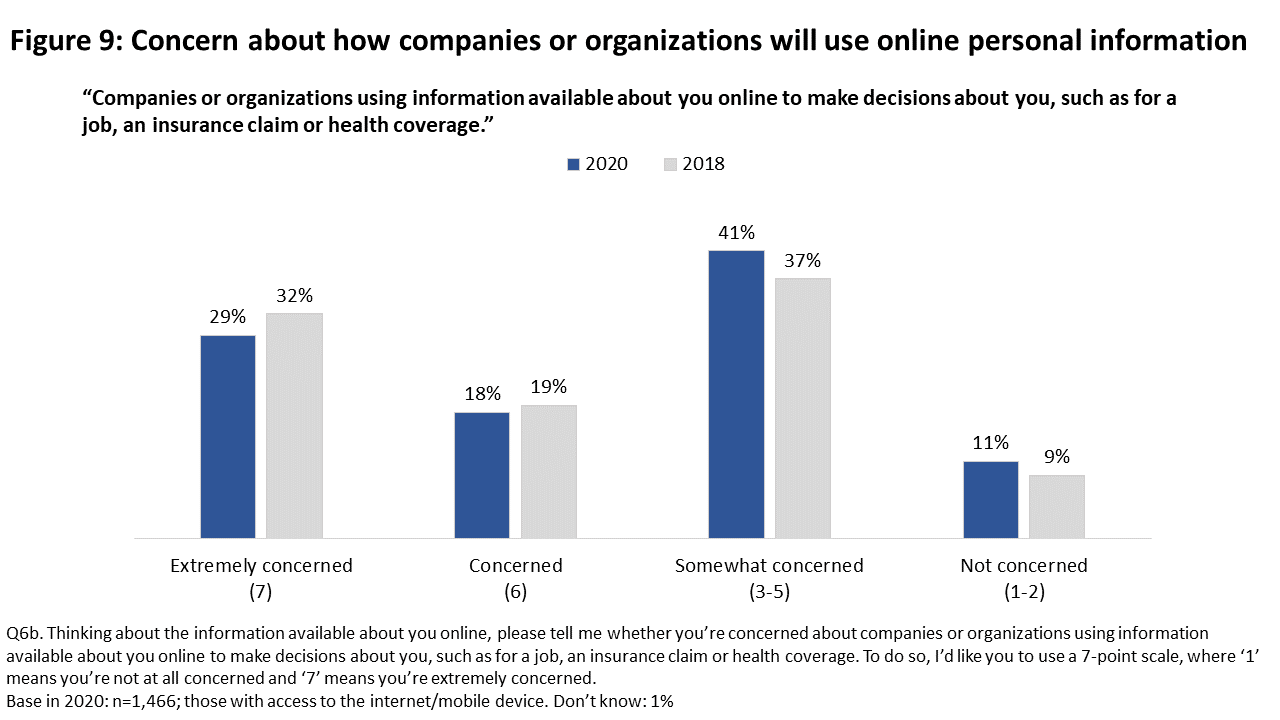
Text version of Figure 9
Figure 9: Concern about how companies or organizations will use online personal information
Q6b. Thinking about the information available about you online, please tell me whether you’re concerned about companies or organizations using information available about you online to make decisions about you, such as for a job, an insurance claim or health coverage. To do so, I’d like you to use a 7-point scale, where ‘1’ means you’re not at all concerned and ‘7’ means you’re extremely concerned.
“Companies or organizations using information available about you online to make decisions about you, such as for a job, an insurance claim or health coverage.”
| Level of concern | 2020 | 2018 |
|---|---|---|
| Extremely concerned (7) | 29% | 32% |
| Concerned (6) | 18% | 19% |
| Somewhat concerned (3-5) | 41% | 37% |
| Not concerned (1-2) | 11% | 9% |
| Base in 2020: n=1,466; those with access to the internet/mobile device. Don’t know: 1% |
||
Concern about companies or organizations using personal information available about online to make decisions about Canadians, such as for a job, an insurance claim or health coverage, generally increased with age.
Widespread concern about identity theft among Canadians
Approximately nine in 10 Canadians (89%) expressed some level of concern about people using information available about them online to attempt to steal their identity, including almost half (48%) who said they are extremely concerned about identity theft. The proportion of Canadians concerned about identity theft has not changed since 2018.
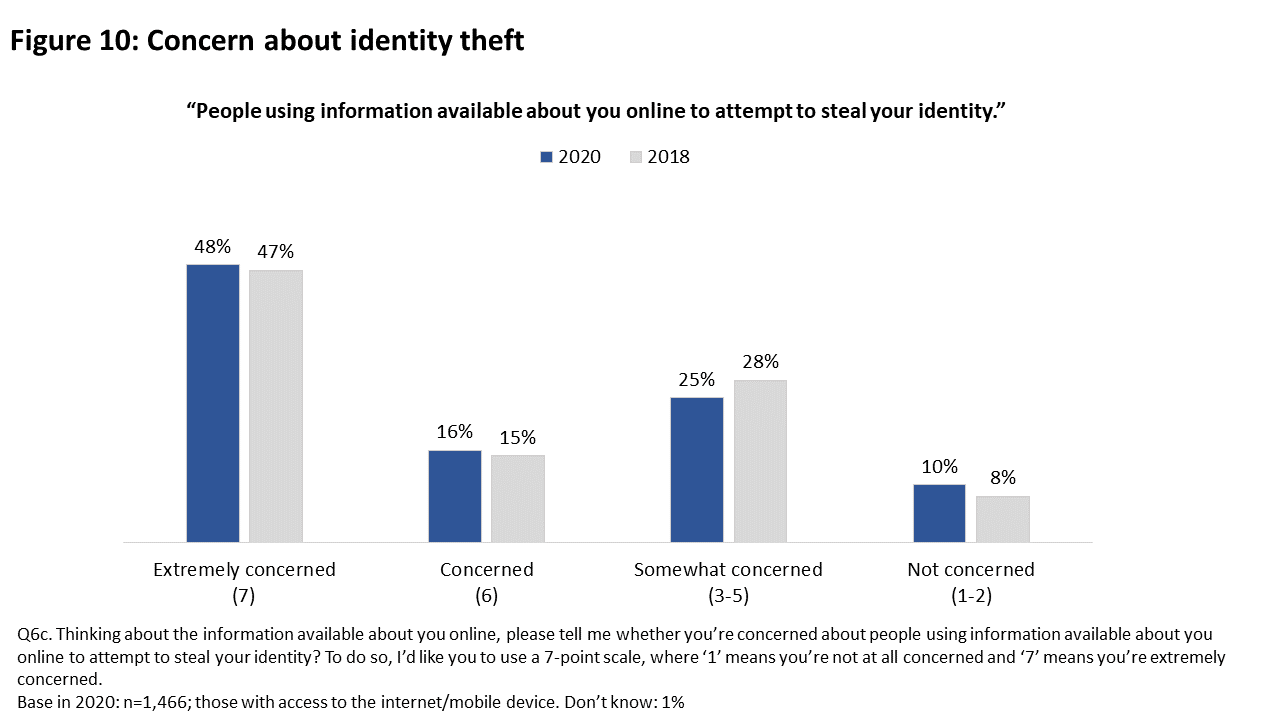
Text version of Figure 10
Figure 10: Concern about identity theft
Q6c. Thinking about the information available about you online, please tell me whether you’re concerned about people using information available about you online to attempt to steal your identity? To do so, I’d like you to use a 7-point scale, where ‘1’ means you’re not at all concerned and ‘7’ means you’re extremely concerned.
“People using information available about you online to attempt to steal your identity.”
| Level of concern | 2020 | 2018 |
|---|---|---|
| Extremely concerned (7) | 48% | 47% |
| Concerned (6) | 16% | 15% |
| Somewhat concerned (3-5) | 25% | 28% |
| Not concerned (1-2) | 10% | 8% |
| Base in 2020: n=1,466; those with access to the internet/mobile device. Don’t know: 1% |
||
Canadians aged 55+ (55%) were more likely to say they are extremely concerned about identity theft compared to those aged 16 to 24 (37%) and 35 to 54 (44%) years of age. Moreover, regionally, respondents in Quebec were more likely than those who reside in other regions of the country to be extremely concerned that the information available about them online might be used to attempt to steal their identity (57% versus 40% of those in British Columbia, 44% of Atlantic Canadians, 45% of Ontarians and 48% of those in the Prairies).
4. Body as Information
Many Canadians are reluctant to share personal information about their body
Six in 10 Canadians (60%) said they are comfortable sharing personal information about their body while talking to a healthcare practitioner by phone or online, but far fewer are comfortable sharing this same information in various other scenarios. In fact, majorities of Canadians indicated they would be uncomfortable providing a DNA sample to a company that might share it with police (60%), providing a DNA sample to a company for genetic testing (55%), and allowing their fitness tracker data to be shared with employer / insurance companies (66%).
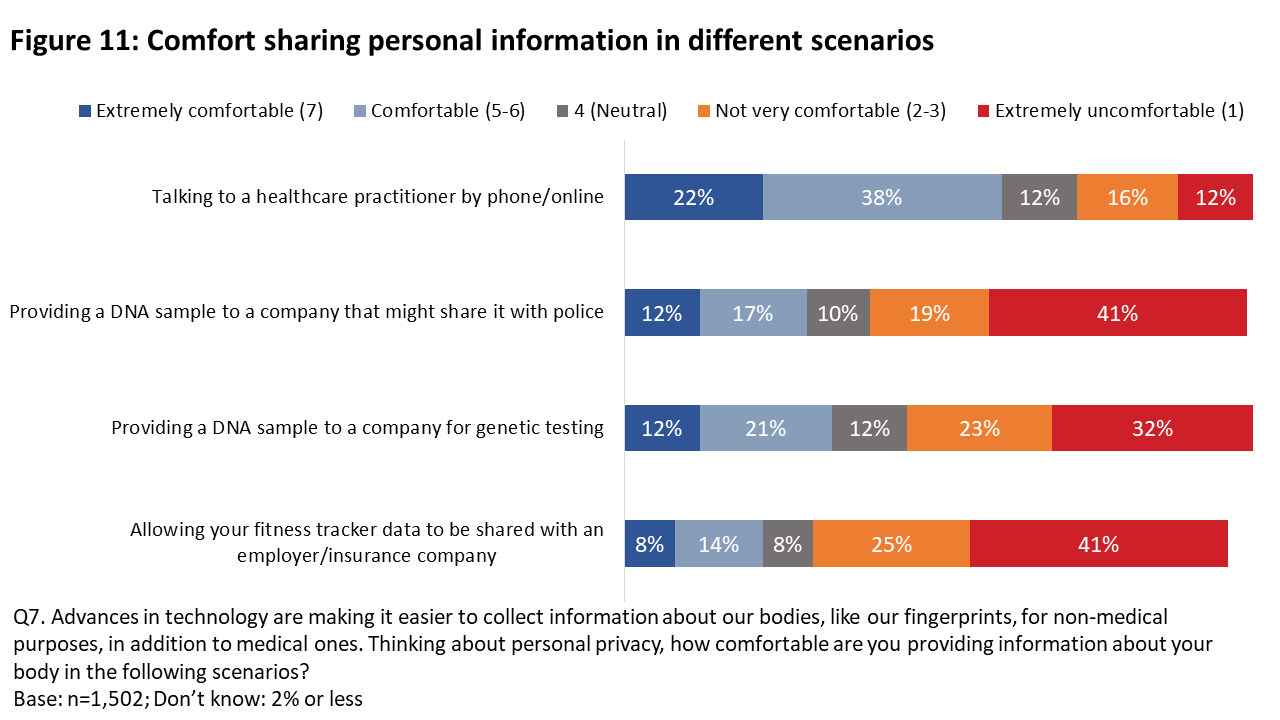
Text version of Figure 11
Figure 11: Comfort sharing personal information in different scenarios
Q7. Advances in technology are making it easier to collect information about our bodies, like our fingerprints, for non-medical purposes, in addition to medical ones. Thinking about personal privacy, how comfortable are you providing information about your body in the following scenarios?
| Scenarios | Extremely comfortable (7) |
Comfortable (5-6) |
Neutral (4) |
Not very comfortable (2-3) |
Extremely uncomfortable (1) |
|---|---|---|---|---|---|
| Talking to a healthcare practitioner by phone/online |
22% | 38% | 12% | 16% | 12% |
| Providing a DNA sample to a company that might share it with police |
12% | 17% | 10% | 19% | 41% |
| Providing a DNA sample to a company for genetic testing |
12% | 21% | 12% | 23% | 32% |
| Allowing your fitness tracker data to be shared with an employer/insurance company |
8% | 14% | 8% | 25% | 41% |
| Base: n=1,502; Don’t know: 2% or less | |||||
With the exception of talking to a healthcare practitioner, the likelihood of being uncomfortable with all these scenarios was higher among Canadians aged 35 and older compared to those aged 16 to 24.
5. Economics of Personal Information
Many Canadians have refused to provide personal information due to privacy concerns
Seven in 10 Canadians (71%; down from 76% in 2018) have refused to provide an organization or business with their personal information due to privacy concerns.
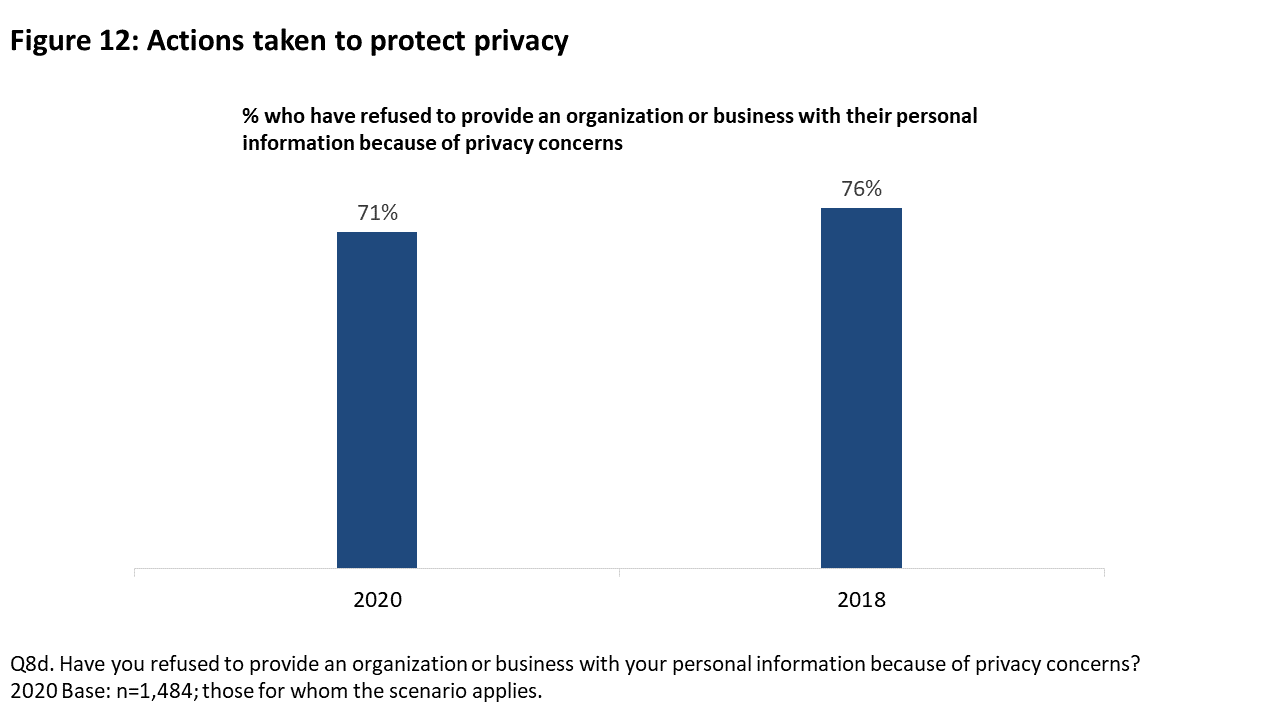
Text version of Figure 12
Figure 12: Actions taken to protect privacy
Q8d. Have you refused to provide an organization or business with your personal information because of privacy concerns?
% who have refused to provide an organization or business with their personal information because of privacy concerns
| 2020 | 2018 |
|---|---|
| 71% | 76% |
| 2020 Base: n=1,484; those for whom the scenario applies. | |
Canadians in Quebec (78%) were more likely than Canadians who reside in the Prairies (67%) and British Columbia (64%) to have refused to provide their personal information to an organization or business because of privacy concerns. Respondents with a university degree (76%) and those aged 35 to 54 (77%) were also more likely to report having refused to provide their personal information to an organization or business.
Nearly four in 10 provide their personal information for discounts and incentives
Nearly four in 10 Canadians (38%) have provided their personal information for discounts or incentives on a good or service. This represents an eight percent increase since 2018 (from 30% in 2018 to 38% in 2020).Footnote 5
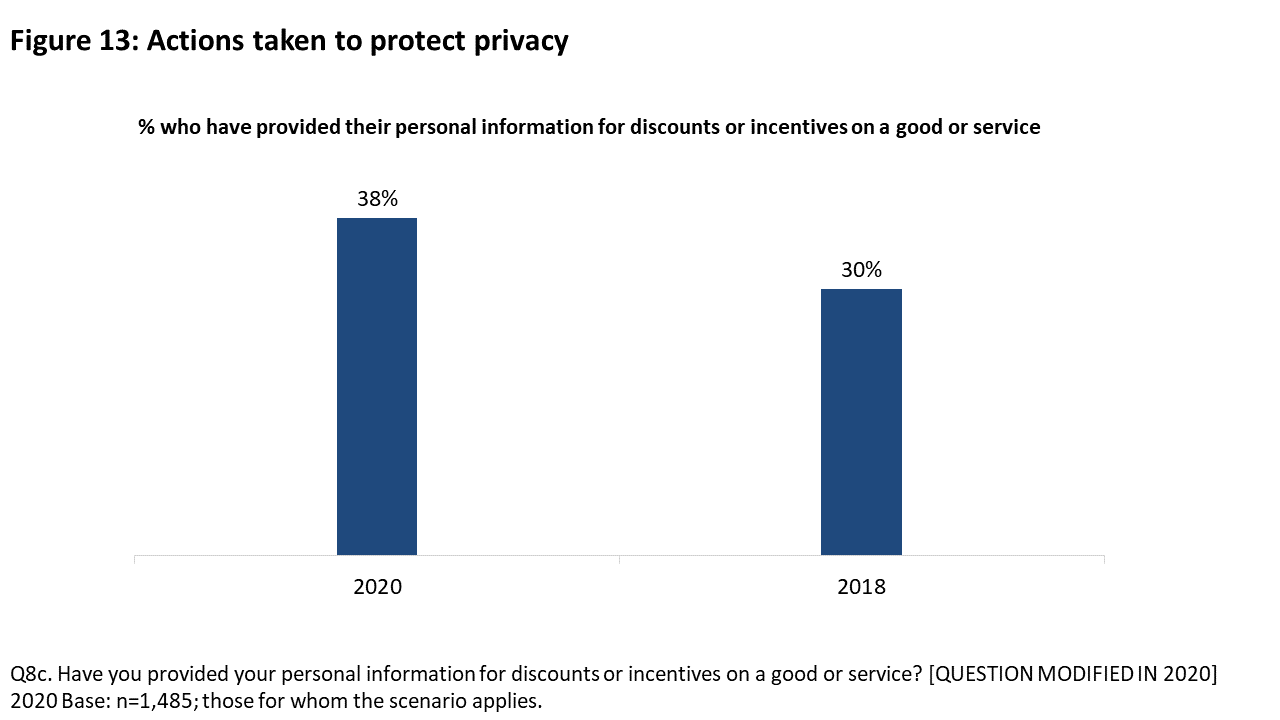
Text version of Figure 13
Figure 13: Actions taken to protect privacy
Q8c. Have you provided your personal information for discounts or incentives on a good or service? [QUESTION MODIFIED IN 2020]
% who have provided their personal information for discounts or incentives on a good or service
| 2020 | 2018 |
|---|---|
| 38% | 30% |
| 2020 Base: n=1,485; those for whom the scenario applies. | |
Regionally, Canadians in Ontario (44%) and the Prairies (36%) were more likely than those who reside in Quebec (29%) to have provided personal information for discounts or incentives. Moreover, willingness to provide one’s personal information in exchange for discounts or incentives was lower among Canadians aged 55+ (25% versus 43% of 35 to 54 year olds, 49% of 25 to 34 year olds, and 49% of 16 to 24 year olds) and higher among university graduates (43% compared to 32% of those who completed high school or less).
Many Canadians have adjusted privacy settings on a social media account; fewer have taken other actions to protect privacy
Three-quarters (74%) of Canadians have adjusted privacy settings on a social media account. Following this, four in 10 have deleted a social media account due to privacy concerns (41%) or stopped doing business with a company that experienced a privacy breach (40%).
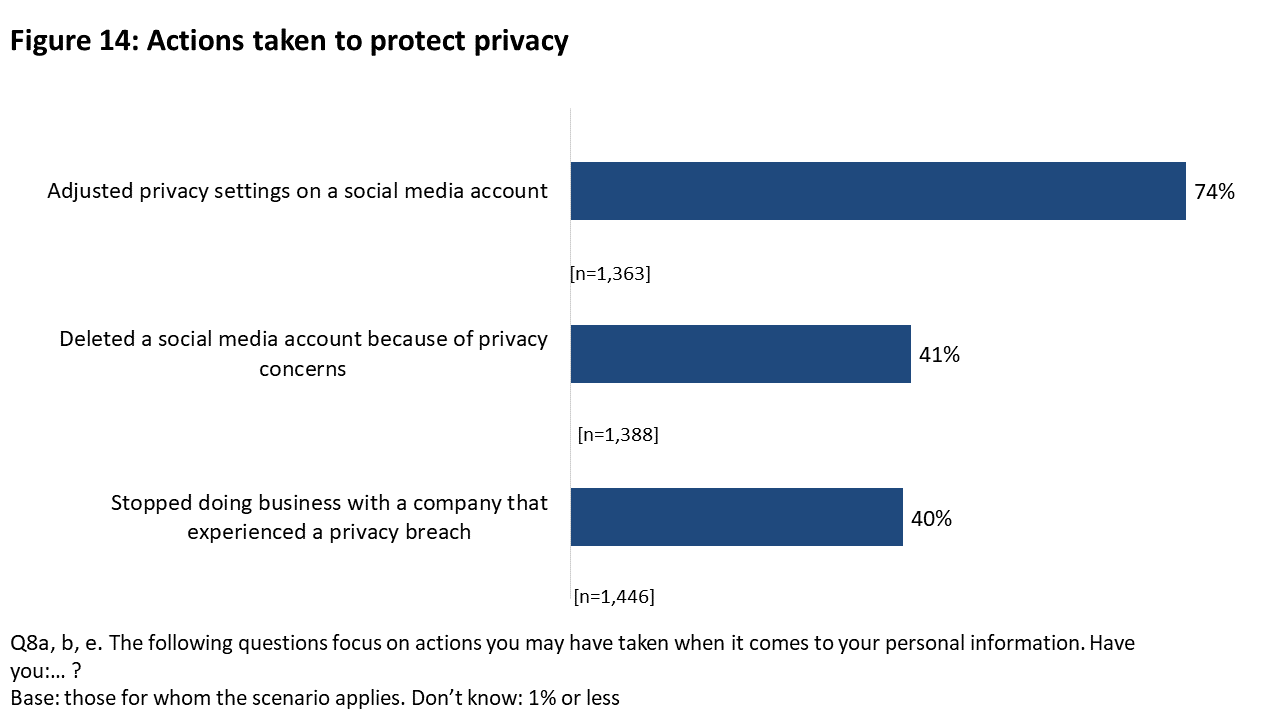
Text version of Figure 14
Figure 14: Actions taken to protect privacy
Q8a, b, e. The following questions focus on actions you may have taken when it comes to your personal information. Have you:… ?
| Actions taken | % of respondents |
|---|---|
| Adjusted privacy settings on a social media account | 74% [n = 1,363] |
| Deleted a social media account because of privacy concerns | 41% [n = 1,388] |
| Stopped doing business with a company that experienced a privacy breach | 40% [n = 1,446] |
| Base: those for whom the scenario applies. Don’t know: 1% or less | |
Canadians in Quebec were most likely to report having deleted a social media account due to privacy concerns (51% versus 34% of respondents from the Prairies, 35% from Atlantic Canada and British Columbia, and 41% from Ontario). Moreover, respondents in Quebec (49%) along with those in Ontario (44%) were more likely than Canadians elsewhere to say they have stopped doing business with a company that experienced a privacy breach (versus 28% of those from Atlantic Canada and British Columbia and 34% of respondents from the Prairies). The likelihood of having adjusted privacy settings on a social media account was lower among those aged 55+ (51% versus 88% of those under 35 and 84% of 35 to 54 year olds) and those who have completed high school or less (62% versus 76% of those who completed college or some university and 79% of those who graduated university).
6. Transparency and Consent
More Canadians oppose than support the Government of Canada having powers to collect and use Canadians’ personal information
One-third of Canadians (32%) support the Government of Canada having powers to collect and use personal information as part of intelligence-gathering activities. Support declines seven percent when respondents were asked if the Government of Canada should have such powers, even if it means Canadians have to give up some personal privacy.Footnote 6
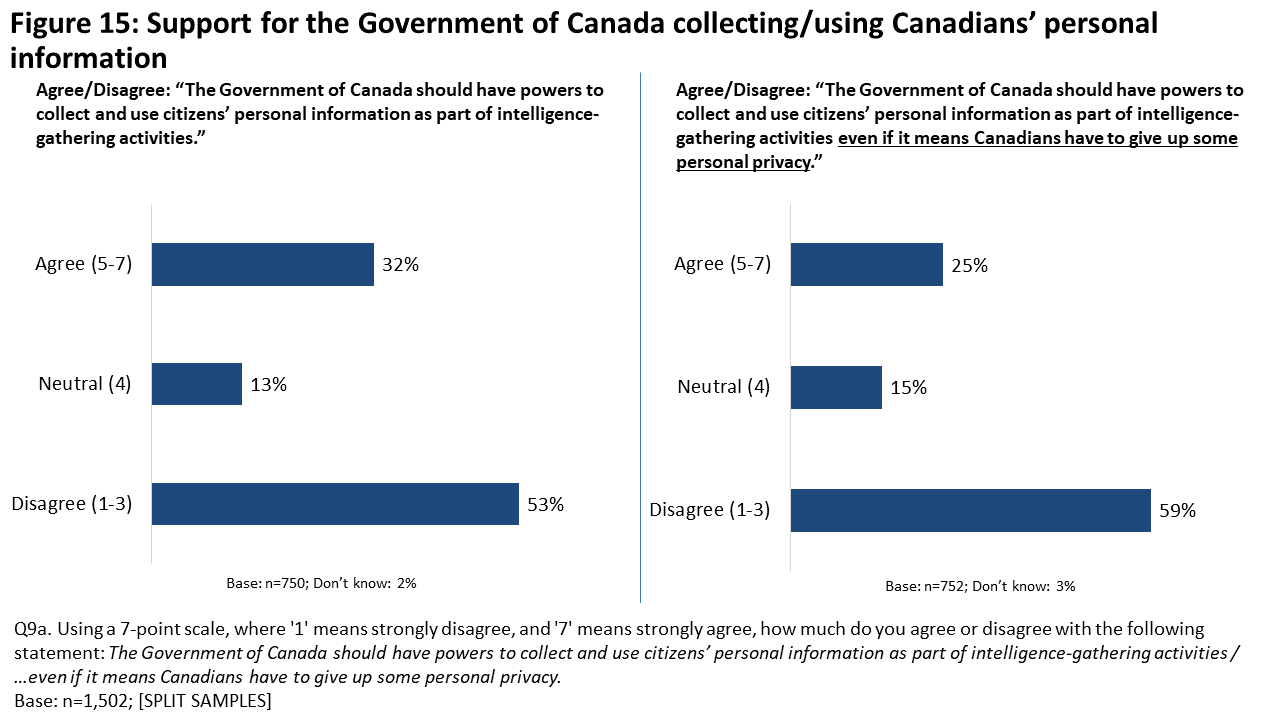
Text version of Figure 15
Figure 15: Support for the Government of Canada collecting/using Canadians’ personal information
Q9a. Using a 7-point scale, where '1' means strongly disagree, and '7' means strongly agree, how much do you agree or disagree with the following statement: The Government of Canada should have powers to collect and use citizens’ personal information as part of intelligence-gathering activities / …even if it means Canadians have to give up some personal privacy.
Agree/Disagree: “The Government of Canada should have powers to collect and use citizens’ personal information as part of intelligence-gathering activities.”
| Level of agreement |
% of respondents |
|---|---|
| Agree (5-7) | 32% |
| Neutral (4) | 13% |
| Disagree (1-3) | 53% |
| Base: n=750; Don’t know: 2% | |
Agree/Disagree: “The Government of Canada should have powers to collect and use citizens’ personal information as part of intelligence-gathering activities even if it means Canadians have to give up some personal privacy.”
| Level of agreement |
% of respondents |
|---|---|
| Agree (5-7) | 25% |
| Neutral (4) | 15% |
| Disagree (1-3) | 59% |
| Base: n=752; Don’t know: 3% | |
| Base: n=1,502; [SPLIT SAMPLES] | |
The following were more likely to agree that the Government of Canada should have powers to collect and use citizens’ personal information for intelligence-gathering activities:
- Canadians in Quebec (42%) compared to those from the Prairies (26%) and British Columbia (26%).
- University graduates (39%) compared to those who completed college or some university (28%).
University graduates (30%) were more likely than Canadians who completed college or some university (20%) to agree that the Government of Canada should have powers to collect and use citizens’ personal information for intelligence-gathering activities even if it means Canadians have to give up some personal privacy.
No consensus on the collection of personal information to inform economic decisions
Four in 10 Canadians (41%) agreed that they would be comfortable with the Government of Canada collecting personal information about citizens from Canada’s financial institutions to make decisions about the economy with respect to things like taxation, spending, and borrowing. However, at 44%, slightly more Canadians disagreed, indicating that they would not be comfortable with this collection of their personal information.
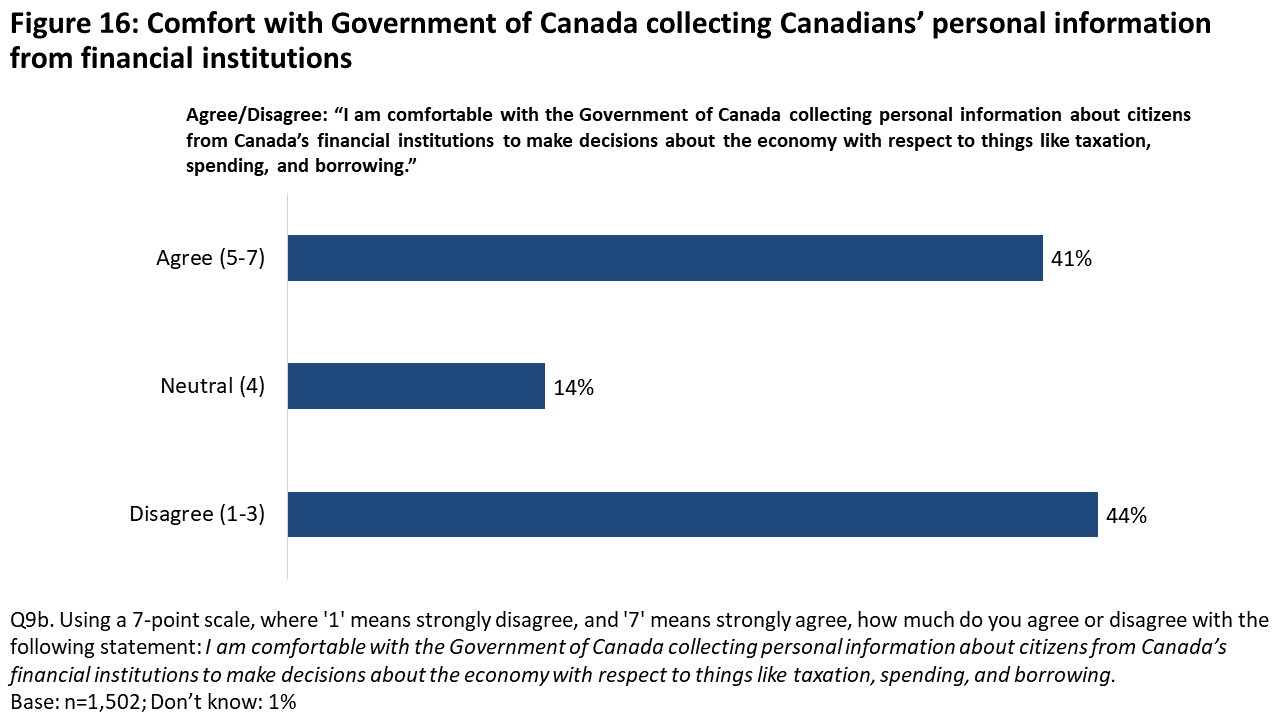
Text version of Figure 16
Figure 16: Comfort with Government of Canada collecting Canadians’ personal information from financial institutions
Q9b. Using a 7-point scale, where '1' means strongly disagree, and '7' means strongly agree, how much do you agree or disagree with the following statement: I am comfortable with the Government of Canada collecting personal information about citizens from Canada’s financial institutions to make decisions about the economy with respect to things like taxation, spending, and borrowing.
Base: n=1,502; Don’t know: 1%
Agree/Disagree: “I am comfortable with the Government of Canada collecting personal information about citizens from Canada’s financial institutions to make decisions about the economy with respect to things like taxation, spending, and borrowing.”
| Level of agreement |
% of respondents |
|---|---|
| Agree (5-7) | 41% |
| Neutral (4) | 14% |
| Disagree (1-3) | 44% |
| Base: n=1,502; Don’t know: 1% | |
Canadians with a university degree (47%) were more likely than those who completed college or some university (35%) to say they are comfortable with the Government of Canada collecting personal information from financial institutions to inform economic decisions. Those aged 55+ (36%) compared to 35 to 54 year olds (42%) and 16 to 24 year olds (52%) were less likely to agree, as were those from the Prairies (31%) compared to Quebec (41%), Atlantic Canada (43%) and Ontario (47%).
Many Canadians are comfortable with the collection of personal information from online sources to investigate potential fraud; fewer are comfortable with this being done to make decisions about programs and services
More Canadians are comfortable with the Government of Canada collecting Canadians’ personal information from online sources, such as social media posts, to investigate potential fraud (57%) than to make decisions about access to government programs and services (45%). Regarding decisions about government programs and services, more Canadians—54%—are not comfortable (as opposed to comfortable) with the Government of Canada collecting their personal information from online sources for this purpose.
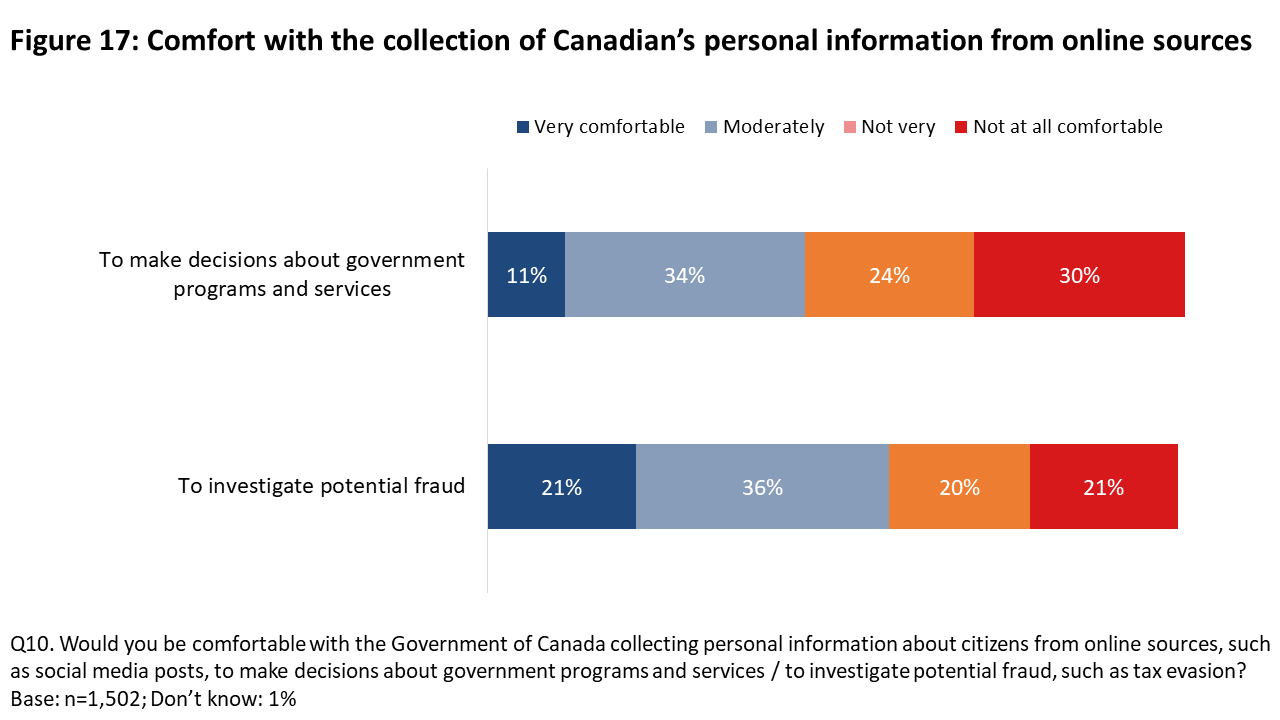
Text version of Figure 17
Figure 17: Comfort with the collection of Canadian’s personal information from online sources
Q10. Would you be comfortable with the Government of Canada collecting personal information about citizens from online sources, such as social media posts, to make decisions about government programs and services / to investigate potential fraud, such as tax evasion?
| Level of comfort | To make decisions about government programs and services |
To investigate potential fraud |
|---|---|---|
| Very comfortable | 11% | 21% |
| Moderately | 34% | 36% |
| Not very | 24% | 20% |
| Not at all comfortable | 30% | 21% |
| Base: n=1,502; Don’t know: 1% | ||
Nearly half of Canadians in Ontario (48%) would be comfortable with the Government of Canada collecting personal information to make decisions about government programs and services (compared to 37% of those from Atlantic Canada and 39% of those from British Columbia). In addition, 16 to 24 year olds (62%) were most likely to be comfortable with this (versus 44% of 25 to 34 year olds, 46% of 35 to 54 year olds and 38% of those aged 55+). When it comes to using this information to investigate potential fraud, Ontarians (62% compared to 51% of those from the Prairies), and Canadians 16 to 24 years of age (67% compared to 53% of those aged 55+) were more likely to have said they are comfortable with this.
Canadians are more likely to feel uninformed about how their personal information is handled by businesses and government
While 43% of Canadians feel informed about how their personal information is handled by companies, slightly more than half (55%) have not very much or no information at all about this. Similarly, 46% of Canadians feel informed about how government handles their personal information and 54% feel they are not well informed about this.
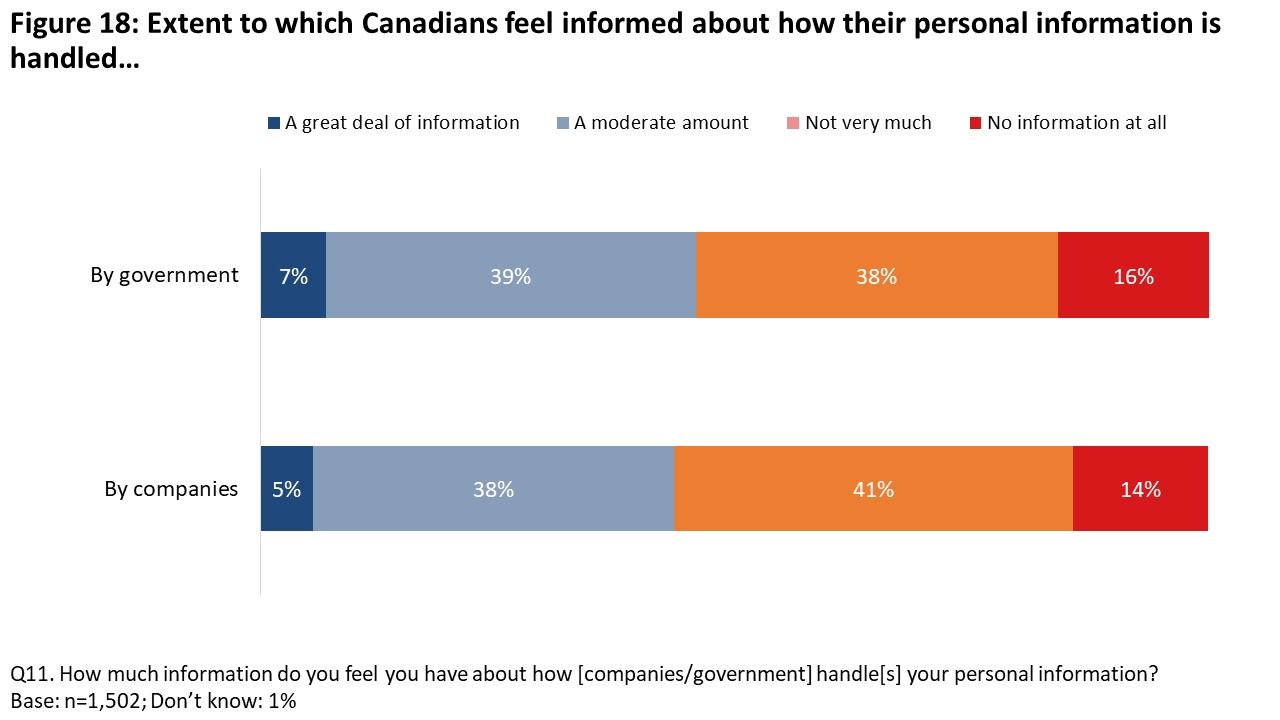
Text version of Figure 18
Figure 18: Extent to which Canadians feel informed about how their personal information is handled…
Q11. How much information do you feel you have about how [companies/government] handle[s] your personal information?
| Amount of information |
A great deal of information |
A moderate amount |
Not very much | No information at all |
|---|---|---|---|---|
| By government | 7% | 39% | 38% | 16% |
| By companies | 5% | 38% | 41% | 14% |
| Base: n=1,502; Don’t know: 1% | ||||
Those in British Columbia (32%) were least likely to have said they feel they have a moderate or great deal of information about how companies handle their personal information (versus 43% of Atlantic Canadians, 47% of Quebeckers, 44% of Ontarians, and 45% of those from the Prairies). In contrast, Quebec residents (55%) were most likely to have said they are informed about how government handles their personal information (41% each of those from the Prairies and British Columbia, 43% of Ontarians and 45% of Atlantic Canadians).
Majority feel they have little control over how their information is used by government or companies
The majority of Canadians feel they have not very much or no control at all over how their personal information is used by companies (61%) or by government (65%). This year, views are consistent with those reported in 2018.
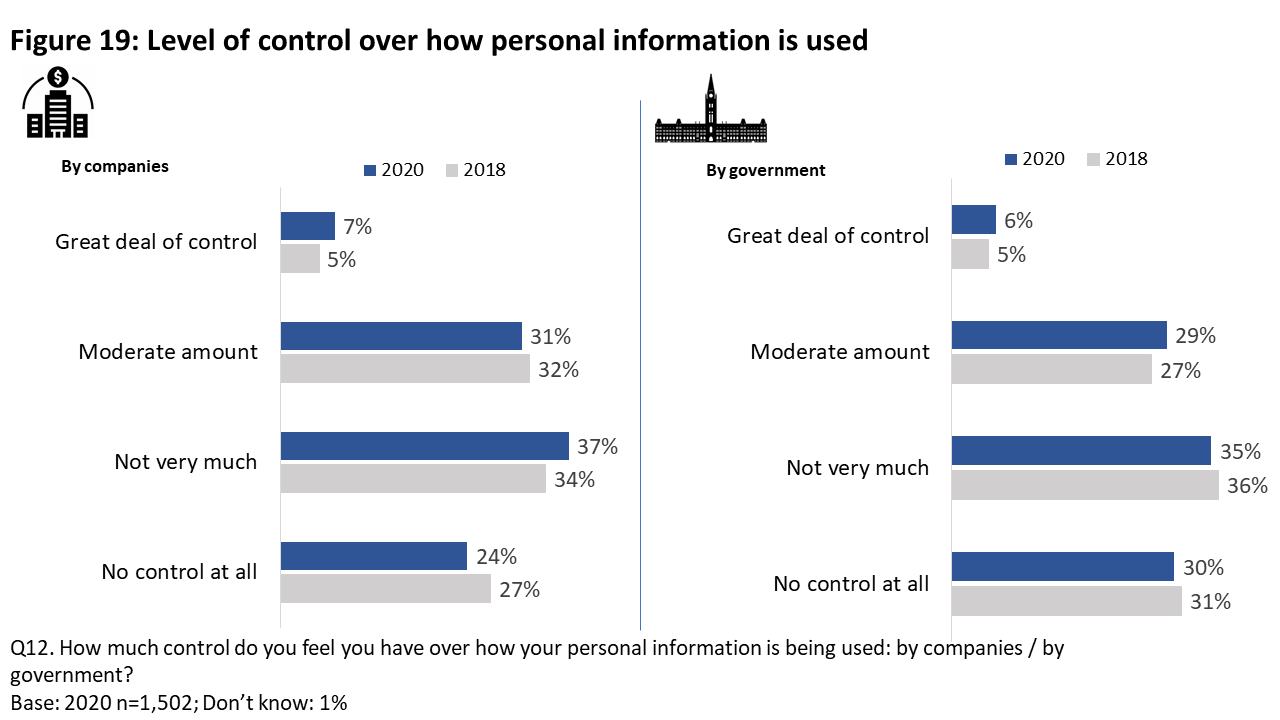
Text version of Figure 19
Figure 19: Level of control over how personal information is used
Q12. How much control do you feel you have over how your personal information is being used: by companies / by government?
| Level of control | 2020 | 2018 |
|---|---|---|
| Great deal of control | 7% | 5% |
| Moderate amount | 31% | 32% |
| Not very much | 37% | 34% |
| No control at all | 24% | 27% |
| Level of control | 2020 | 2018 |
|---|---|---|
| Great deal of control | 6% | 5% |
| Moderate amount | 29% | 27% |
| Not very much | 35% | 36% |
| No control at all | 30% | 31% |
| Base: 2020 n=1,502; Don’t know: 1% | ||
The following groups were more likely to have said they have a great deal or a moderate amount of control over how their information is used by companies:
- Those from the Prairies (43%), Atlantic Canada (41%) and Ontario (40%) compared to those from British Columbia (26%).
- 16 to 24 year olds (53%) compared to 35 to 54 year olds (36%) and those aged 55+ (33%).
- Canadians who completed high school or less (47%) or college or some university (38%) compared to university graduates (31%).
Women (38%) were more likely than men (32%) to feel they have a great deal or a moderate amount of control over how their information is used by the government.
7. COVID-19
Most Canadians’ views on privacy and the protection of their personal information have not been impacted by COVID-19
Approximately seven in 10 (69%) Canadians said their views of privacy and the protection of their personal information have not changed in any way since the start of the COVID-19 pandemic in March 2020. In contrast, one in three (29%) said their views have changed since March 2020.
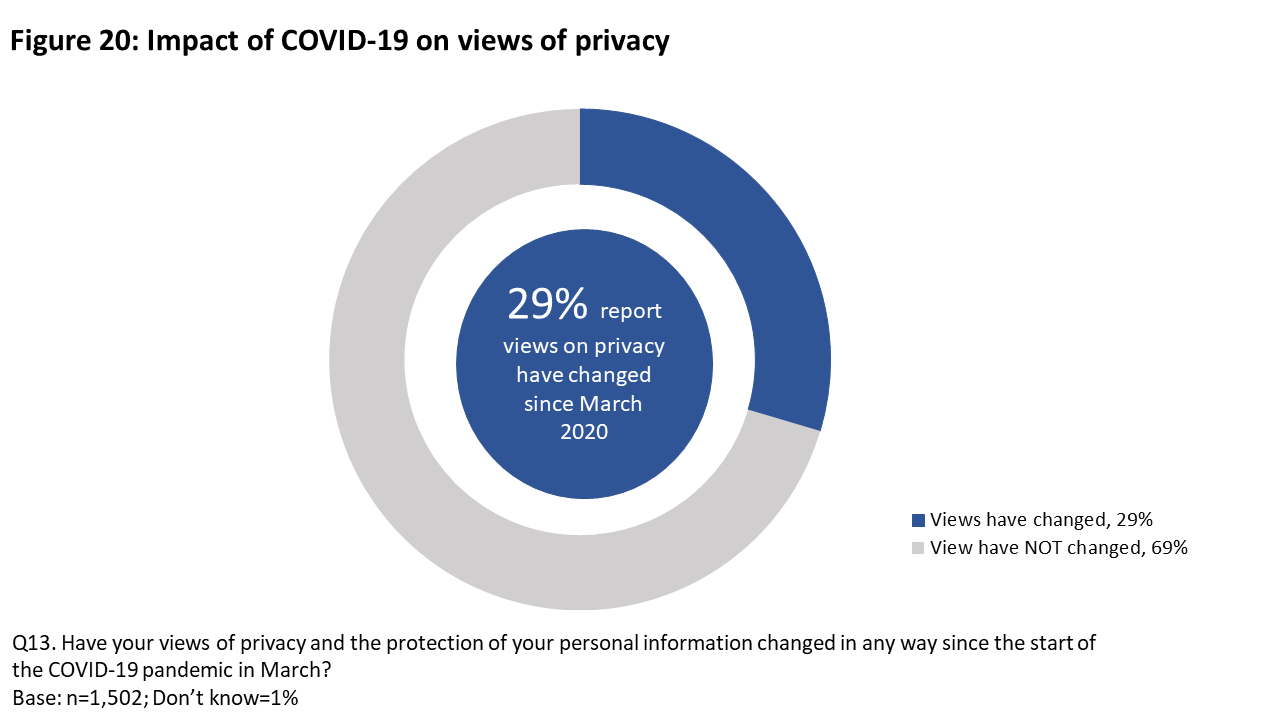
Text version of Figure 20
Figure 20: Impact of COVID-19 on views of privacy
Q13. Have your views of privacy and the protection of your personal information changed in any way since the start of the COVID-19 pandemic in March?
| Impact on views | % of respondents |
|---|---|
| Views have changed | 29% |
| View have NOT changed | 69% |
| Base: n=1,502; Don’t know=1% | |
Regionally, Quebeckers (34%) were more likely to report that their views regarding the protection of their personal information have changed since the beginning of COVID-19, particularly in comparison to those in Atlantic Canada (25%), and British Columbia (25%).
Many Canadians say they are more concerned about the protection of their personal privacy
Among Canadians who said their views regarding the protection of their personal information have changed since COVID-19 (n=408), nearly half (48%) reported that they are more concerned about personal privacy now. Following this, 39% said they are more aware about providing personal information. One in 10 each are less trusting of government (11%) and businesses (7%) when it comes to privacy and their personal information. The full range of responses are depicted below in figure 21.
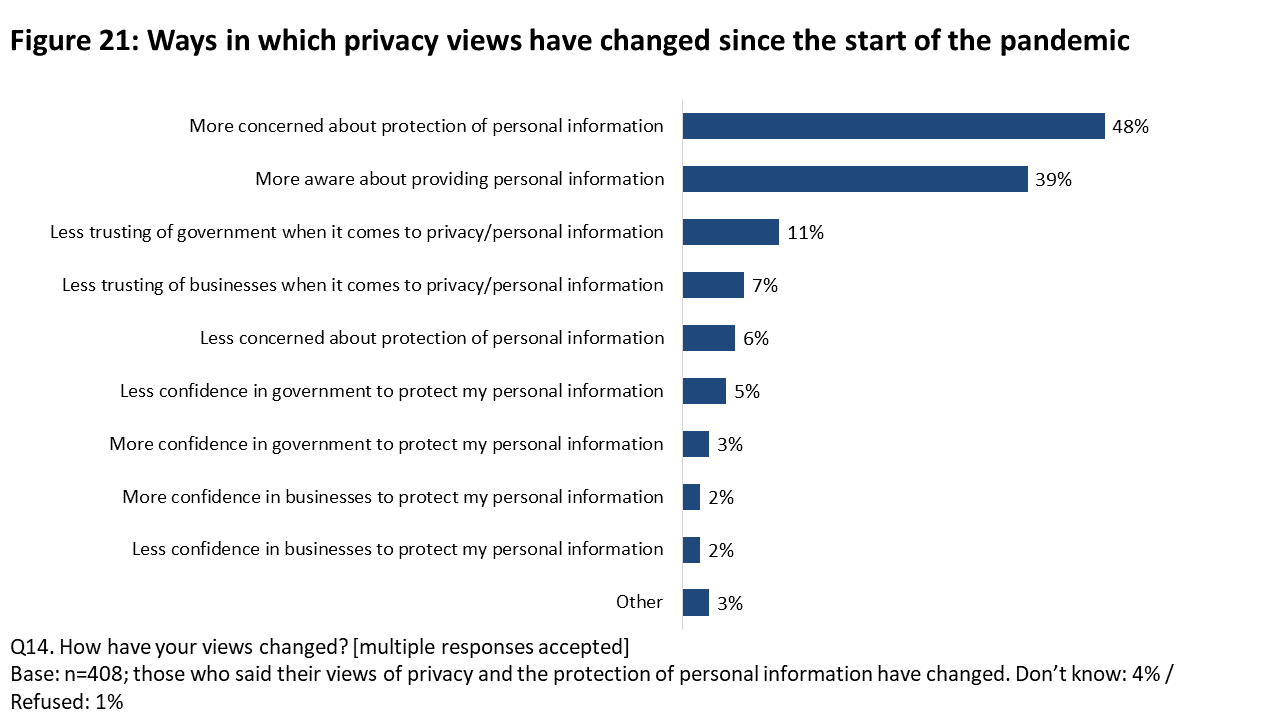
Text version of Figure 21
Figure 21: Ways in which privacy views have changed since the start of the pandemic
Q14. How have your views changed? [multiple responses accepted]
| Level of change | % of respondents |
|---|---|
| More concerned about protection of personal information | 48% |
| More aware about providing personal information | 39% |
| Less trusting of government when it comes to privacy/personal information | 11% |
| Less trusting of businesses when it comes to privacy/personal information | 7% |
| Less concerned about protection of personal information | 6% |
| Less confidence in government to protect my personal information | 5% |
| More confidence in government to protect my personal information | 3% |
| More confidence in businesses to protect my personal information | 2% |
| Less confidence in businesses to protect my personal information | 2% |
| Other | 3% |
| Base: n=408; those who said their views of privacy and the protection of personal information have changed. |
|
| Don’t know: 4% / Refused: 1% | |
Canadians in Atlantic Canada (59%) and Ontario (55%) were more likely to report being more concerned about the protection of personal information now than they were prior to the COVID-19 pandemic. In contrast, those in Quebec (49%) and the Prairies (50%) were, instead, more likely to report being more aware when providing personal information.
Appendix
1. Technical Specifications
The following specifications applied to this survey:
- A 14-minute random digit dialling (RDD) telephone survey was administered to 1,502 Canadian residents, 16 years of age or older, between November 21st and December 20th, 2020.
- Elemental Data Collection Inc. (EDCI) carried out data collection, under subcontract to Phoenix SPI.
- The questionnaire was pre-tested in advance of the fieldwork to ensure that it measured what it intended to measure and that respondents understood the questions.
- An overlapping dual-frame (landline and cell phone) sample was used to minimize coverage error. The same random selection process was used for both the landline and cell phone sample, thereby ensuring the integrity of the probability sample.
- The sample frame was geographically disproportionate to improve the accuracy of regional results. The distribution of completed surveys was as follows:
| Strata | Completed Interviews |
|---|---|
| Atlantic | 201 |
| Quebec | 351 |
| Ontario | 400 |
| Prairies * | 350 |
| British Columbia ** | 200 |
| Total | 1,502 |
| * Includes Nunavut and the Northwest Territories. | |
| ** Includes the Yukon Territory. | |
- Based on a sample of this size, the overall results can be considered accurate within ±2.5%, %, 19 times out of 20 (adjusted to reflect the geographically disproportionate sampling).
- The following table presents information about the final call dispositions for this survey and calculation of the response rate:
| Final call dispositions | Total | Landline | Cell |
|---|---|---|---|
| Total Numbers Attempted | 89,951 | 48,364 | 41,587 |
| Out-of-scope - Invalid | 62,872 | 30,576 | 32,296 |
| Unresolved (U) | 15,072 | 9,785 | 5,287 |
| No answer/Answering machine | 15,072 | 9,785 | 5,287 |
| In-scope - Non-responding (IS) | 10,397 | 6,921 | 3,476 |
| Language barrier | 402 | 255 | 147 |
| Incapable of completing (ill/deceased) | 159 | 135 | 24 |
| Callback (Respondent not available) | 1,185 | 453 | 732 |
| Refusal | 8,287 | 5,866 | 2,421 |
| Termination | 364 | 212 | 152 |
| In-scope - Responding units (R) | 1,610 | 1,082 | 528 |
| Completed Interview | 1,502 | 1,015 | 487 |
| Quota Filled | 44 | 42 | 2 |
| Not Qualified – Employment exclusions | 48 | 25 | 23 |
| Not Qualified – Age | 16 | 0 | 16 |
- The overall response rate was 10% (10% for the landline sample and 9% for the cell phone sample). The response rate formula is calculated as follows: [R=R/(U+IS+R)]. This means that the response rate is calculated as the number of responding units [R] divided by the number of unresolved [U] numbers plus in-scope [IS] non-responding households and individuals plus responding units [R].
- The survey data have been weighted by region, age and gender using population figures from Statistics Canada’s 2016 census data. The weights correct for the disproportionate regional sampling. Any respondents who refused to provide their age were given a neutral weight so as not to skew the weighting proportions. The table below shows the unweighted and weighted proportions for the variables used to create the weights:
| Proportions for the variables used to create the weights | Unweighted | Weighted |
|---|---|---|
| Base | n=1,502 | n=1,502 |
| Region | ||
| Atlantic Canada | 201 | 101 |
| Quebec | 351 | 351 |
| Ontario | 400 | 574 |
| Prairies * | 350 | 271 |
| British Columbia ** | 200 | 204 |
| Age | ||
| 16 to 24 | 72 | 198 |
| 25 to 34 | 115 | 236 |
| 35 to 54 | 388 | 486 |
| 55 or older | 898 | 552 |
| Gender | ||
| Male | 705 | 722 |
| Female | 780 | 763 |
| Another gender | 5 | 5 |
| * Includes Nunavut and the Northwest Territories. | ||
| ** Includes the Yukon Territory. | ||
- A non-response analysis was conducted to assess the potential for non-response bias. Survey non-response can bias results when there are systematic differences between survey respondents and non-respondents. The survey sample differs from the population more significantly in terms of age (as is often the case with telephone surveys of the general population). Canadians under 35 were under-represented in the survey sample and those aged 35 and older were over-represented in the survey sample. To estimate the amount of bias introduced into the survey results, the unweighted and weighted results by age were compared for Q1: knowledge of privacy rights. The analysis indicates that the age bias had virtually no impact on the survey estimates for knowledge of privacy rights.
2. Survey Questionnaire
Introduction
Hello / Bonjour (pause), the Government of Canada is conducting a research survey on issues of interest to Canadians. Would you prefer that I continue in English or French? Préférez-vous continuer en français ou en anglais?
My name is [Interviewer's name]. I’m calling on behalf of Phoenix SPI, a public opinion research company. The survey takes less than 15 minutes and is voluntary. Your participation is voluntary and confidential. Your answers will remain anonymous, and the information you provide will be administered according to the requirements of Canada’s privacy laws. May I continue?
[LANDLINE SAMPLE]
A. We choose telephone numbers at random and then select one person from each household to be interviewed. To do this, we would like to speak to the person in your household, 16 years of age or older, who has had the most recent birthday. Would that be you?
No - ASK TO SPEAK TO ELIGIBLE PERSON; REPEAT INTRO
[CELL SAMPLE]
B. Are you 16 years of age or older?
No - THANK/DISCONTINUE
C. Are you in a place where you can safely talk on the phone and answer my questions?
No - ASK D
D. We would like to conduct this interview with you when it is safe and convenient to do. When would it be more convenient for me to call back?
[EVERYONE]
E. Do you work in any of the following areas? [READ LIST]
The media (i.e. TV, radio, newspapers)
THANK/DISCONTINUE IF ANY OF THE ABOVE
THANK/DISCONTINUE MESSAGE: “Thank you for your willingness to take part in this survey, but you do not meet the eligibility requirements of this study.”
F. In which province or territory do you live?
Prince Edward Island
Nova Scotia
New Brunswick
Quebec
Ontario
Manitoba
Saskatchewan
Alberta
British Columbia
Yukon
Northwest Territories
Nunavut
PROGRAMMING NOTES:
- Accept Don’t know and Refused for all questions if volunteered by a respondent.
- Record Don’t know and Refused separately for all questions.
- Section headings should not be read to respondents.
- Reveal the sponsor – Office of the Privacy Commissioner of Canada – at the end of the survey.
- For questions about the legitimacy of the survey, invite the respondents to use the Canadian Research Insights Council’s Research Verification Service. PROJECT NUMBER: 20201009-PH791.
Knowledge, Concern and General Perceptions
Many of the questions in this survey are about privacy and the protection of personal information. Personal information includes things like your name, income, and email address, as well as information like your purchasing habits and online activities.
- How would you rate your knowledge of your privacy rights? Please use a scale of 1 to 7, where '1' means very poor and '7' means very good. [TRACKING]
- Using the same scale of 1 to 7, how would you rate your knowledge of how to protect your privacy rights? [TRACKING]
- In general, are you concerned about the protection of your privacy? Please use a scale of 1 to 7, where ‘1’ means not concerned at all, and ‘7’ means extremely concerned. [TRACKING-MODIFIED]
- Please tell me how much you agree or disagree with the following statements. To do so, use a 7-point scale, where ‘1’ means you strongly disagree and ‘7’ means you strongly agree. [TRACKING]
[READ/ROTATE]- I feel that businesses in general respect my privacy rights.
- I feel that the federal government in general respects my privacy rights.
- I am confident that I have enough information to know how new technologies might affect my personal privacy.
5. How much trust do you have in the following organizations to protect the personal information you share with them? Do you have a great deal of trust, a fair amount of trust, not much trust, or no trust at all in …. [READ/ROTATE ITEMS]? [NEW]
- Banks
- Telecommunications and internet companies
- Online retailers
- Social media companies
- The “big tech” companies like Microsoft, Apple and Google
Online and Mobile Privacy
These next questions deal with issues related to online and mobile privacy.
[IF A RESPONDENT VOLUNTEERS THAT HE/SHE DOES NOT USE THE INTERNET OR HAVE A MOBILE DEVICE, RECORD THIS AND SKIP TO Q7.]
6. Thinking about the information available about you online, please tell me whether you’re concerned about each of the following. To do so, I’d like you to use a 7-point scale, where ‘1’ means you’re not at all concerned and ‘7’ means you’re extremely concerned. How about... [TRACKING – 6a - MODIFIED]
[READ/ROTATE]
- Social media platforms gathering personal information [SPLIT SAMPLE: that you have / someone else has] posted online to create a detailed profile of your interests and personal traits for marketing purposes.
- Companies or organizations using information available about you online to make decisions about you, such as for a job, an insurance claim or health coverage.
- People using information available about you online to attempt to steal your identity.
Body as Information
7. Advances in technology are making it easier to collect information about our bodies, like our fingerprints, for non-medical purposes, in addition to medical ones. Thinking about personal privacy, how comfortable are you providing information about your body in the following scenarios? Please use a 7-point scale, where ‘1’ means you’re extremely uncomfortable and ‘7’ means you’re extremely comfortable with this. [NEW]
[READ/ROTATE]
- Providing a sample of your DNA to a company to perform genetic testing to determine your likelihood for developing future health conditions.
- Allowing information collected by your fitness tracker to be shared with your employer or insurance provider.
- Providing a sample of your DNA to a DNA testing company if this company may share your genetic data with police and law enforcement agencies.
- Talking to a healthcare practitioner over the telephone or online about health concerns instead of during an in-person appointment.
Economics of Personal Information
8. The following questions focus on actions you may have taken when it comes to your personal information. Have you:… ? ROTATE ITEMS; RECORD YES/NO; ACCEPT DOES NOT APPLY IF VOLUNTEERED. [TRACKING 7c and d only -c MODIFIED]
- Adjusted privacy settings on a social media account?
- Deleted a social media account because of privacy concerns?
- Provided your personal information for discounts or incentives on a good or service?
- Refused to provide an organization or business with your personal information because of privacy concerns?
- Stopped doing business with a company that experienced a privacy breach?
Transparency and Consent
9. Using a 7-point scale, where '1' means strongly disagree, and '7' means strongly agree, how much do you agree or disagree with the following statements: [READ/ROTATE] [NEW]
- The Government of Canada should have powers to collect and use citizens’ personal information as part of intelligence-gathering activities / [SPLIT SAMPLE: 50% TO BE READ THIS ADDITION] …even if it means Canadians have to give up some personal privacy.
- I am comfortable with the Government of Canada collecting personal information about citizens from Canada’s financial institutions to make decisions about the economy with respect to things like taxation, spending, and borrowing.
10. Would you be comfortable with the Government of Canada collecting personal information about citizens from online sources, such as social media posts, [INSERT A/B ON ROTATION]? IF “COMFORTABLE”, ASK: would that be moderately comfortable or very comfortable / IF “NOT COMFORTABLE”, ASK: would that be not very comfortable or not at all comfortable? And what about INSERT B/A ON ROTATION? [NEW]
- to make decisions about government programs and services
- to investigate potential fraud, such as tax evasion
11. How much information do you feel you have about how [READ ITEM/ROTATE] handle[s] your personal information? Would you say a great deal of information, a moderate amount, not very much, or no information at all? [NEW]
- companies you do business with
- government
12. How much control do you feel you have over how your personal information is being used [READ ITEM/ROTATE]? Would you say a great deal of control, a moderate amount, not very much, or no control at all? [TRACKING]
- by companies you do business with?
- by government?
COVID-19 [NEW]
The pandemic has resulted in more daily activities, such as work, school, shopping and doctor’s visits being carried out online. I’d like to talk about privacy issues related to the COVID-19 pandemic.
13. Have your views of privacy and the protection of your personal information changed in any way since the start of the COVID-19 pandemic in March?
No
IF Q13=YES, OTHERWISE GO TO Q15:
14. How have your views changed? [DO NOT READ LIST; ACCEPT MULTIPLE RESPONSES, BUT DO NOT PROBE]
- More concerned about protection of personal information
- Less concerned about protection of personal information
- More confidence in government to protect my personal information
- Less confidence in government to protect my personal information
- More confidence in businesses to protect my personal information
- Less confidence in businesses to protect my personal information
- Less trusting of government when it comes to privacy and my personal information
- Less trusting of businesses when it comes to privacy and my personal information
- Other: (specify)
Demographics
The last few questions are for classification purposes only. Your answers will remain anonymous and confidential.
15. In what year were you born?
[If the respondent prefers not to provide a precise birth year, ask:]
16. Would you be willing to tell me in which of the following age categories you belong? [READ]
25 to 34
35 to 44
45 to 54
55 to 64
or 65 or older?
[Do not read] Prefer not to answer
17. What is your gender? [READ]
Male
Other - Please Specify
[Do not read] Prefer not to answer
18. What language do you speak most often at home? [READ; ACCEPT MULTIPLE RESPONSES]
French
Other
[Do not read] Prefer not to answer
19. What is the highest level of formal education that you have completed? [READ LIST]
High School diploma or equivalent
Registered Apprenticeship or other trades certificate or diploma
College, CEGEP or other non-university certificate or diploma
University certificate or diploma below bachelor's level
Bachelor's degree
Postgraduate degree above bachelor's level
[DO NOT READ] Prefer not to answer
That concludes the survey. Thank you very much for your thoughtful feedback. It is much appreciated. This survey was conducted on behalf of the Office of the Privacy Commissioner of Canada.
Record by observation:
- Language of interview
- Date modified:

